#it's critical analysis time
Note
in reference to your "if you like tom taylor's writing you're white" post, could you possibly elaborate? i don't want this to sound rude so i'm a little nervous about sending but!! i like his writing, i am also white, and i would like to know any issues in his writing that i can look out for so i can enjoy it critically. i realize i'm not entitled to an answer, but if you feel like it then i would appreciate it greatly!
Of course darling.
Now, I was just going to talk about some dumb plotlines if this ever came up (like the telenovela shit and the fact that he uses cameos from beloved stories to make up for the fact that very little of his plotlines are original) but I didn't expect such a genuine answer and I have some free time... so I guess I'm doing doing a breakdown of all of the bullshit in his writing.
For the record: I'm not going to speak on how he handles disabled people. It's neither on topic nor my place. Several people have done this well here, here, and here if this interests you.
There are two main reasons why (tw for a bunch of stuff, don't read if you're sensitive):
How he treats race
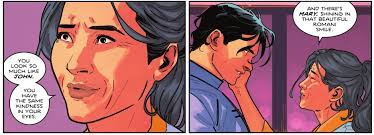
I bring to the stand: "the romani smile incident".
Listen, I feel like this one was good-intentioned. Maybe. Probably. However, it's just so fucking weird from every angle I try and look at it from.
Telling someone they have a "(insert race here) smile" is already just... a very strange way to do representation. If you want to call back to/confirm his Romani heritage, which I would be all for, do it in a way that makes sense. Please. Literally anyone that thought about it for longer than half a second stopped and went "sorry, what the fuck".
I saw some people theorizing that he probably thought that, since there's such thing as a "white person smile", there had to be something like that for other races. And I hope that's the case.
It's funny... and also way better than the alternative.
Because there is a phrase like that for Romani people: "they had a (g-slur) smile". It generally means all of the things that are stereotyped about that culture. Mischievous, free-spirited, mysterious, etc. Changing it so the slur isn't used doesn't change the connotation and continues the perpetuation of stereotypes.
And then there's the entirety of this picture:
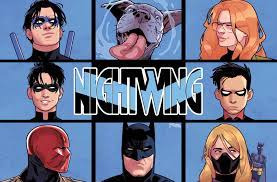
I don't even know where to start with this one, honestly.
Damian has been whitewashed to hell and back.
Duke isn't even there. He is considered part of the core batfam nowadays, so it's very strange that he hasn't been included. Especially since he's the only black character. Tom defended himself by saying that Duke hasn't appeared in a Nightwing comic in quite some time, but he has control over who is in the comics. He is the writer. And, since Cass is in the background of one of the pictures, the whole "there wasn't enough room!" doesn't really work.
And, speaking of that, Cass is in the background? The people of color are just not winning today. She's even in the background of Steph's picture, which makes it worse. Steph isn't even a part of the batfam, she can't be for the sake of Timsteph fans, she's just a family friend. Why did the family friend get to be in the front of the frame? Why is Cass, an Asian woman, considered a literal background character?
... anyways.
Then there's the zionism
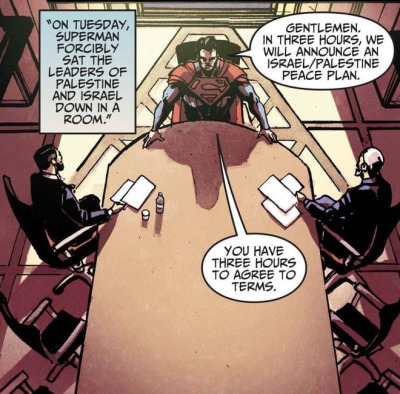
This was 2013, so I genuinely would give the benefit of the doubt here... but Tom Taylor recently defended his past self by saying that "it's fiction, that doesn't mean I agree that he should have forced them to sign a peace treaty!", which means he still doesn't understand what is wrong with implying that the war in the middle east isn't a group of people trying to fight back against their oppressors.
2. Performative activism
The reason I have this second, despite feeling like it's the stronger argument, is because performative activism isn't strictly a White Person Thing... but, also, yes it is. So, let's get into his politics.
The treatment of homeless people: It's strange to see Dick Grayson suddenly "discover" homeless people in the most recent Nightwing comics, especially since he was homeless for a while in a previous run. I brushed past this, originally, though, because I figured he just wanted to address the recent talking point about how Bruce Wayne (and, by extension, his kids) should be using his money to help people in need rather than beat up the poor and I wanted to see what he did with it. I no longer let it go, because Tom Taylor has nothing to say. Homelessness bad. Yeah? You gonna address it at all, buddy? Some solutions? Some explanations for why homelessness exists? No? "Donate to the homeless" is all you're gonna say? Alright. Thank you for all your wisdom and new ideas, I guess.
The whole 'school gun violence' plotline with Jon was whack. It honestly deserves its own post, but I refuse to spend even more time thinking about it. Instead I'm just gonna sum up the villain's motivation and leave it there: the villain... wants school shootings to stop and therefore tries to draw attention to them... by shooting up a school.
Jon Kent... honestly, his whole thing at the moment is very white-savior-y, which is already annoying in itself, but that's not the real point here. His whole thing is saving the planet in the environmental sense, but Tom Taylor loves "good billionaires". He made Nightwing a billionaire. For some reason, I don't have much faith in his understanding of the global climate crisis.
Basically, if I see one more person call Tom Taylor a leftist I will scream. I am a leftist, he's an annoying liberal. We are not the same.
More seriously, the reason that I think performative activism is almost strictly White Person Thing, though, is because most people of color think more about what's going on and have more to say. Not because we want to know a lot about things like this, but because we have to. Systemic issues are our problems to deal with and white people's problem to sometimes talk about when they want some "good person points". And yet they never seem to do anything more than point at an issue and say it's an issue. It's a privileged position to be in.
And, we're done. If you want more information, try going through the 'anti tom taylor' tag. I'm lazy and don't have enough time to do any more before class. Byeeeee.
#me: i will not elaborate#also me literally the moment someone asks: sldfjslkdfjsdlkfjdkdfj#it's critical analysis time#fuck this guy. what a weird man.#i also don't like how he treats wonder woman#or dick grayson for that matter#but that's neither here nor there#anti tom taylor#to be safe#nightwing#superman#jon kent#dick grayson#edited for spelling and wording#wasn’t kidding when i said i had no time before class#ask#ollieanswers#forgot those tags lmao
110 notes
·
View notes
Text
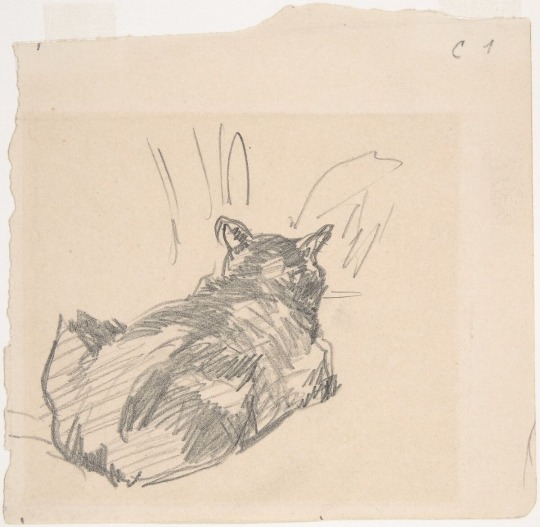
A Cat Resting on All Fours, Seen from Behind. Edouard Manet, 1861. Graphite on paper.
#usually the objective on this blog is critical analysis but the truest function of sketches of cats is just for all of us across time and#culture to go Awwwww Look At Him!#cat#cats#drawing#art history#edouard manet
638 notes
·
View notes
Text
Katara's Legacy in LOK: "Healer Wife of the Avatar" (part I)
I only recently finished watching all of The Legend of Korra from start to finish. Based on the analyses I’ve read from the time the show was airing, there seemed to be a decent amount of backlash against how the adult gaang was portrayed - particularly Katara. LOK’s fanbase has grown since then, though, especially during the 2020 renaissance, and I was surprised by how many recent positive comments I’ve seen from fans on Katara’s role.
Because if you paid attention at all to Katara’s characterization compared to Aang, Sokka, Toph, and Zuko, it’s clear just how much Legend of Korra has tarnished her “legacy” or lack thereof.
I will be splitting this analysis of lok!Katara into two parts:
First, I will break down her portrayal in the show compared to the other members of the gaang to demonstrate how Katara received the worst treatment from the writers. Though I did have problems with the other characters’ portrayals as well, I don't have time to discuss them in-depth in this post. Then, I will counter common arguments used in defense of lok!Katara’s portrayal on the grounds that they do not provide an adequate in-universe explanation for her character’s drastic change from ATLA.
For part 1, I decided to examine everything we know about the gaang after the original series only based on the information provided via Legend of Korra (excluding poor Suki, who is never mentioned at all). For each character, I will answer the question “What do we know about [character] based solely on their role in Legend of Korra?”
Sokka

Assuming we have never watched ATLA before, what do we know about Sokka based on LOK?
Well-respected for his wisdom and leadership, as he was Chief of the Southern Water Tribe, a councilman in Republic City (Representative of the Southern Water Tribe), and the chairman of the United Republic Council
Played a significant role in Yakone’s bloodbending trial - moderated the Council’s deliberations and announced their decision to find Yakone guilty
Worked together with other political/military leaders - Zuko, Tenzin, and Tonraq - to protect Avatar Korra by designing prisons for Red Lotus members that would be impervious to their bending
Toph mentioned they were friends in their youth, describing a time he was stuck in a hole when she was trying to teach Aang earthbending
Sokka, Toph, and Aang seemed to have remained friends into adulthood as they all worked together to defeat Yakone
Fond of his trusty boomerang, which he claimed to have used to win a fight against a man with combustion abilities
Due to his achievements, has a statue built in his honor in front of the Southern Water Tribe Cultural Center in Republic City
Zuko
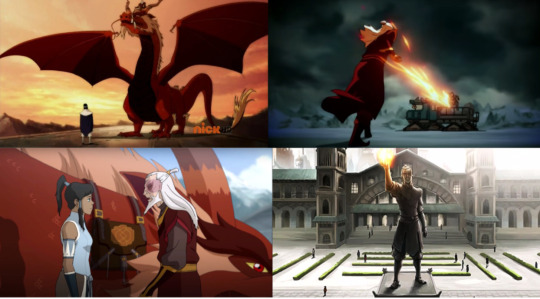
Assuming we have never watched ATLA before, what do we know about Zuko based on LOK?
Former Fire Lord and co-founder of the United Republic, who worked with Avatar Aang after the 100 years war to transform the Fire Nation colonies into the United Republic of Nations
Zuko and Avatar Aang had a rocky start, as Zuko described a time when he once hired a man with combustion abilities to kill Aang in his youth, but they eventually became close friends
Acted as Aang’s counsel and was described as being the person who knew Aang better than everyone else, leading Korra to turn to him for advice
Good friends with the Southern Water Tribe - worked with Sokka, Tonraq, and Tenzin to imprison Red Lotus members that wanted to kidnap Korra, specifically working with Unalaq and Tonraq to build a prison to hold P’Li
Years later, continued to work against the Red Lotus when they broke out of prison
Investigated the prison break of Ming-Hua, sent word to Lin Beifong to protect Korra, then flew off on his dragon to stop the Red Lotus from breaking P’Li out of prison
Fought Ghazan using his firebending during the Red Lotus break-in
Discussed the Red Lotus situation with Lin, Korra, and the others, before leaving early on Druk (his dragon) to return to the Fire Nation and protect his family
Despite being in “retirement,” remains an active participant in international relations - makes appearances as Prince Wu’s coronation and Jinora’s airbending master ceremony, along with engaging in discussions with President Raiko, Tenzin, and Tonraq about the future of the Red Lotus after Zaheer was imprisoned again
Highly respected and honored for his achievements - Bolin and Mako were impressed to meet him, statue was built in his honor in Republic City
Had a close relationship with his Uncle and his surviving family include his daughter, Fire Lord Izumi, and his grandson, General Iroh II
Toph
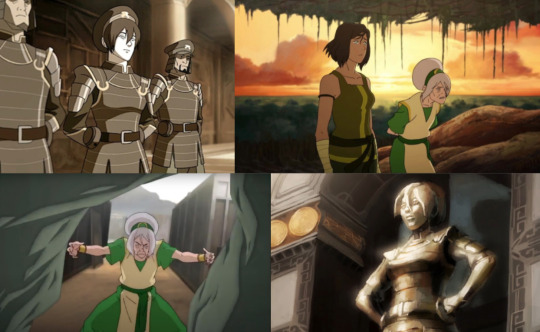
Assuming we have never watched ATLA before, what do we know about Toph based on LOK?
Previous Chief of Police in Republic City, founder of the first metalbending police force, founder of the first metalbending academy
Renowned for inventing metalbending, which is utilized for the development of modern technology and innovation in Republic City and the Earth Kingdom (particularly, Zaofu, is regarded as the safest city in the world due to it being made entirely out of metal)
To honor her metalbending achievements, there are several statues of her in Zaofu
Good friends with Avatar Aang, whom she affectionately named Twinkletoes, and was his earthbending teacher
Worked with Aang to arrest Yakone and was present at Yakone’s trial
Acted as a mentor to Korra, helping Korra face her fears and trained with her
Despite her old age and grumpy personality, Toph remained a strong fighter - easily able to beat Korra during training sessions, take down Kuvira’s sentries, and successfully break into Kuvira’s prison using her earthbending and metalbending abilities
States that her fighting days are over due to her old age, but has no problem fighting to save her family when they are captured by Kuvira (twice)
No interest in involving herself in current political problems in the Earth Kingdom, but will defend her family from political forces that threaten them
Strained relationship with her daughters (Suyin and Lin) because of how busy she was with her job, giving them too much freedom as she didn’t want to be as strict as her own parents
Covered up for Suyin’s crimes to save her reputation, leading her to retire early from guilt
Eventually repairs her relationship with her daughters - admitting she wasn’t a great mother but had great kids
Spent rest of her life living alone in a swamp, mentioning she has previous experiences with the visions it produces
High reputation in Republic City - has a statue of her built in front of police headquarters, Asami is impressed by her, Bolin calls her his hero
Aang
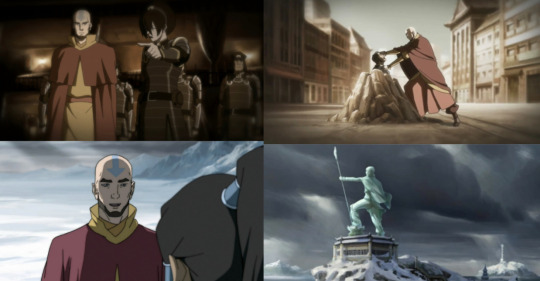
Assuming we have never watched ATLA before, what do we know about Aang based on LOK?
Previous Avatar before Korra, negotiated relations between people of all nations to keep peace and balance and served as the bridge between the Spirit World and natural world
Worked with his closest friend Zuko to transform the Fire Nation Colonies into the United Republic of Nations after the war
Lost his entire culture of Air Nomads to genocide during the hundred year war and was devastated - his greatest dream was frequently described as rebuilding the Air Nation and reviving Air Nomad culture
He began to do this by founding the Air Acolytes, who preserved the culture, practices, and teachings of the Air Nomads passed on from Aang
Placed all of his hopes and dreams for the future on Tenzin's shoulders, his only airbender son
Deeply connected to the Spirit World and was an esteemed spiritual leader, hoping his son would one day experience the same
Traveled the world with Tenzin so he could learn as much as possible, but was so focused on doing his duty to the world that he never had time for his other kids, Kya and Bumi, whom he had with his wife, Katara
Kya and Bumi felt like a disappointment to their father for not being airbenders and Bumi never felt connected to his father’s culture until he became an airbender later in life
Aang’s acolytes did not even know Aang had other children besides Tenzin
All of this seems to indicate Aang valued the ability to airbend the most in his children, leading to his waterbending/nonbending kids being neglected
Greatest flaw mentioned as his tendency to cut and run when things get tough
Despite all this, he was highly respected and admired by most characters in the show for all his achievements as Avatar and his wisdom
Assisted in the arrest of Yakone with Toph, a friend of his, and used energybending to remove Yakone’s bending
Gave Korra advice along with restoring her bending and bestowed upon her the ability to energybend
His grandkids (Meelo, Jinora, and Ikki) enjoyed hearing stories about his youth, such as his visit to Wan Shi Tong’s spirit library and his time with Guru Pathik at the Eastern Air Temple
Described as natural leader by Tenzin, sweet-tempered by Lin, and was good friends with Iroh
He built the air temple on Air Temple Island and in his honor, Aang Memorial Island was named after him and a statue of him was built
He’s so well-known and respected that there are even Aang-themed carnival games at the South Pole
Katara
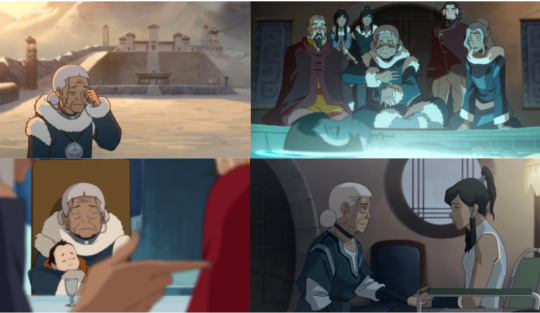
Assuming we have never watched ATLA before, what do we know about Katara based on LOK?
Described as the best healer in the world, responsible for teaching Korra how to heal, and mentioned to be a waterbending master
Monitored Korra’s avatar training and spoke to the Order of the White Lotus when Korra was ready to begin airbending training
Declared bloodbending illegal, but was not present for Yakone’s capture or trial
Attempted to restore Korra’s bending after Amon took it, but failed
Failed to heal Jinora when she was trapped in the Spirit World
Tries to guide Korra’s healing process after she is poisoned, but is unable to heal her on her own
Worked to heal the injured after Unalaq’s attack
According to Toph, Katara didn’t get involved in the civil war taking place in her homeland because of her old age
Mentions to Korra she knows what it’s like to go through a traumatic experience but doesn’t elaborate, instead describing Aang’s trauma
Married to Avatar Aang and had three kids - Tenzin, Kya, and Bumi - and three grandchildren - Ikki, Jinora, and Meelo
After Aang and her brother died, she was incredibly lonely, prompting Kya to move to the south pole to be with her. Misses her family that has passed away.
Her kids don’t visit her much, Meelo doesn’t even recognize his grandmother. She cries when Tenzin and his family leave.
Never speaks about her own life, but Jinora asks her once about what happened to Zuko’s mom, indicating they may have known each other.
By reading those summaries, it should be obvious just how differently Katara’s character was treated by the writers compared to the others. Katara’s legacy is reduced to simply being the “healer wife of the Avatar.”
And before anyone tries to twist my words: The problem is not that she is a mother, a wife, and a healer. The problem that is all she is ever allowed to be. Her entire identity revolves around:
Trying to heal people
Being the Avatar’s wife and occasionally offering random pieces of advice about what Aang would do (instead of, you know, giving advice based on her own experiences)
Missing her family
Again, none of these characteristics are inherently negative - the problem is how poorly they are written for Katara’s character. We are told things about her that just don't match up with what is shown in LOK canon. We're told that she’s a world renowned healer, but every time we see her use these abilities, she fails. We’re told that she’s the Avatar’s wife, but he was closest to his friend, Zuko. We’re told that she’s a mother who cares about her family, but we don’t know anything about her relationship with her children (and in fact, we know far more about her children's relationship with Aang).
Katara has no characteristics, no personality outside of her relationship to others - whether she’s acting as a healer, a mother, or a wife (this is some textbook misogynistic writing). She never speaks about herself, never mentions having any friends - only ever speaking about her husband, never describes her life before being a mother or a wife, is never shown to be honored or respected in the way the rest of the gaang is, has no political titles, and has only one post-atla accomplishment to her name. This is in contrast to Aang, Zuko, and Toph - all of whom have children but are never reduced solely to being a parent, all of whom are implied to be close friends, and all of whom have made multiple important contributions to the world of LOK. Even Sokka - who is barely in the show - is shown as having more achievements than Katara. I’m not sure how anyone could see this as doing Katara’s character justice.
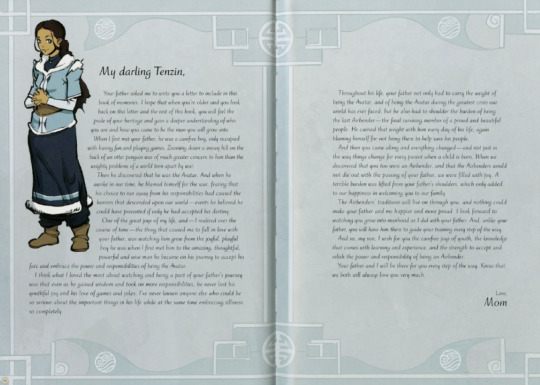
I want to end with this excerpt from the book Avatar: The Last Airbender: Legacy - while not from Legend of Korra, this letter written by Katara to her and Aang's son, Tenzin, is a perfect demonstration of Katara's poor characterization post-ATLA. Despite being written by Katara, this entire letter is about Aang. I'm honestly not sure why the writers didn't just have this letter written by Aang himself because there are no insights that Katara adds to it.
The letter starts with Katara saying that she hopes this letter will help Tenzin "feel the pride of [his] heritage and gain a deeper understanding of who [he is]." And yet this letter never discusses the fact that Tenzin is the son of a waterbender and an airbender, never discusses any of the lessons Katara has learned in her life or the hardships she's overcome, never mentions any part of water tribe culture, never even mentions her own brother or father or mother (family is important to Katara, but apparently the writers only think that her family with Aang matters). The letter is entirely about Aang's struggles and triumphs because post-ATLA Katara doesn't matter outside of her relationship to her husband and kids.
Part 2
#katara#katara analysis#atla#zutara#anti lok#lok critical#this is not shipping related at all but tagging zutara for visibility#pls show up in the tags tumblr i don't want to repost this a third time#my post#my meta
212 notes
·
View notes
Text
Maybe I'll make a post on this at some point but like, something deeply fucked up about TNP and Po3 that people have totally forgotten about is how badly they try to whine that "Tigerstar Had Good Traits :("
Firestar does it, Brambleclaw does it, and they keep doing this after it becomes this GRAND irony that Firestar almost gets Tiger'd to death in a fox trap because he was too trusting. Bramble gets his pity award of keeping deputyship and then cries to his son about how No One Saw The Good In Tigerstar :(
And it's wiiiiild that no one else in this fandom has done anything with the fact that Leopardstar broke the Warrior Code to appoint Hawkfrost, who had no apprentice, an extremely aggressive and warmongering Tigerclone who says things like "Tigerstar wasn't the worst cat to look up to." ONLY qualifying trait was being kinda like Tigerstar.
And she practically did that the SECOND Mistyfoot went missing. And then Leopardstar continued to be one of the most violent and xenophobic leaders through Po3, joining with WindClan to attack ThunderClan.
What I'm getting at is that like, a few years ago, with books like "Blackfoot's Reckoning" and "Shadow in RiverClan" it's like they suddenly decided to retcon in a bunch of "redemption arcs" in hindsight. They just pretended like there was this grand high reckoning with TigerClan, when there literally wasn't, and if anything that caused SERIOUS problems for the cast that the authors didn't fully acknowledge as such.
And now ppl haven't actually read the main series and are just working with their recent memory of all these retcon books.
But TNP and PO3 are still there, and you can go and see the ACTUAL timeline where Leopardstar is really not apologetic at all, and Blackstar is a useful stooge for the very next wannabe dictator that strolls in, in spite of the new side content that COMPLETELY mischaracterized them for their plots to work.
#I just wish people could be more critical of this#And im not entirely anti-retcon. Mind you#But I am here because i think these retcons make them WORSE characters. It's BAD for a character to GET a book with a redemption arc and--#Then they don't change at all and act like totally different people later in the timeline#And Leopardstar is the worse one between her and Blackstar BECAUSE she has sooo many active choices here#Im confident in my choice for BB the more I think about it. Leopardstar's dismantling of the bonehill was good#But it works better as a tragedy imo with the rest of the series in mind#That for a brief moment. A fleeting whim. She could have changed.#But she never did.#And Blackstar who was FAR less repentant at the time DID eventually turn around.#At the end of the day one of them appointed Hawkfrost as codebreaking deputy.#And the other did not.#And I think it's fucking bullshit the way that Leopardstar's retcondemption implies that Hawkfrost was just so tricky he mislead her#The old and experienced leader who had been fooled by a tiger before and was soso sorry for it. Just got tricked.#Like fuck off. She never had a redemption. Stop trying to tell me she did 15 years later#She's a girlboss who empires too close to the sun in pursuit of power and drags everyone down with her#Not a sad weepy smolbean#Bone babble#Warrior cats analysis
192 notes
·
View notes
Text
It's funny really, how much the children have taken from their adoptive parents.
How looking at them is something akin to looking in a mirror.
Chayenne who is eerily similar to Philza with the same blue hair and blue eyes, the same nose, but whose smile is all Missa's. Who loves deeply, like them both, who likes cooking and avoids larger crowds, who has no time for people's bullshit, who likes stories, farming potatoes and training with his weapons.
Ramon whose tiny smile is a carbon copy of Fit's, something precious to be cherished like the gift it is. Who is clever and resourceful and focused on what really matters, hardworking to a fault.
Leonarda with Vegetta's purple eyes and Foolish's cheekbones and nose. Leo who is creative and protective, who will defend her loved ones with everything she has, who wants pretty things and nice buildings in her name, who enjoys the good things in life.
Dapper who is his father's copy, who proudly display the demonic traits many hide in shame, the midnight skin, the white eyes, the little horns. Dapper who is clever, who likes to play with the obscure, who collects animals, who is fiercely protective of her loved ones.
Tallulah who may as well be Wilbur's copy as well, the same curly brown hair, the same big dark eyes, whose smile is just the tiniest bit crooked, exactly like Phil's. Tallulah who loves music so very deeply, who is passionate and puts her heart into her projects.
It's tragic really, how much the children have taken from their adoptive parents.
How looking at them is something akin to looking in a mirror.
Chayenne who is the oldest. The little warrior, his father’s son in bravery and courage and protectiveness, Chayenne who has taken the role of the protector without having to be told.
Chayenne, who is his fathers’ son. Who hides his insecurity and his fear because he cannot allow himself to appear weak or scared because all the siblings are looking at him for comfort, for guidance. Chayenne who takes every single thing gone wrong as a signal of his failure, of his weakness, who fear every single day that his siblings, that his parents, are going to look at him and see the scared little boy who cannot save his siblings, who failed them so many times and just keeps on failing.
And that they will realize he is not worth their time or their love.
Chayenne who is his father’s son and cannot put those insecurities into words, who cannot talk about them because they are his burden to care, because his parents and siblings have more important things to care about, because he is the oldest and he is not suppose to give them reasons to worry, he is supposed to be strong and reliable.
He has never been taught to be honest about his fears, he has watched as his father takes on the responsibility of taking care of another child by himself without a word of protest, he has watched as he father held his emotions close to his chest and he has learned to do the same.
Chayenne like his father Missa, who believes he is not worth of their love unless he proves it with his actions, who is scared of failure as much as he is scare of trying, who struggles with what he truly wants to do, with the childish urges to just have fun, to just ask for a hug or to cry in the embrace of a loved one, and the believe of what he thinks he must do, stay strong and brave and keep his siblings safe so that they do not share his pain, so that they know they are loved and appreciated and that they are safe with him.
Leonarda who shares her pa Foolish's loneliness.
Leonarda who has so very few people she feels like she can trust, so very few people she believes would even care to look at her twice, and who has lost, on multiple occasions, those people, who has felt alone and scared too many times to count.
She hides her feelings deep inside even when it hurts, can't bear to expose them to the world because she knows how easily the world will step on them, how easily they will laugh at her or even ignore her pain because they are so very used to not thinking about her at all. Leo who clings to her loved ones with protective fierceness, even with jealousy, because she has so very few of them.
Just a child, a child like the others, yet most of the time people don't seem to take her seriously, just like they don't take her pa seriously, Leonarda who just like her pa Vegetta feels like she must step up as the protector, that she has to take charge into protecting the one person who has always seem and understood her, who will put him above everyone else because she knows that they will never be anyone's else priorities.
Lonely little girl with her lonely silly father, waiting for a ghost, surviving on memories.
Dapper who is the victim of sins that don't belong to her. Dapper, forever burdened by actions they didn't take, a child punished by the sins of the father. A child, who will gladly take the burden of pain if that means his sister and father will remain safe and unharmed.
Dapper who trusts very few people, Dapper who like her father keeps her plans to herself, who wants to fix things with his own hands, who doesn't want others to be sucked into their plans, who doesn't want anyone to ever be hurt for their sake, Dapper who loves so very deeply but who like the man who raises him do not know how to trust, how to let others help.
A child, so familiar with death. A child, so understanding that everything comes to an end, so utterly aware that her time is counted and all the implications of it. A child, like her father, so connected with death, a child who does not fear death, but rather the consequences of his passing will have on the ones he loves the most. A child, who never puts himself as a priority in his plans, a child who always thinks about the bigger picture, who hides her pain and his fears because they are not as important as getting the results.
Ramon who is so serious, so comically serious, a child who tries to behave so much older than his years. Ramon who doesn't like to be sentimental, who doesn't like to talk about mushy things, who doesn't even call Fit "dad" even if he has loved him since the beginning.
A child forced to grow up so quickly. A child with adult's fears. A child who wants to make plans for his father in case one day he wouldn't be here to take care of Fit anymore, who wants him to have other people.
Ramon who will show his love in little gestures, in short phrases he will pretend he never said after, who like Fit tackles emotions like dangerous mobs, who don't know how to tame the storm that breeds inside his chest, who doesn't know how to express the vulnerability that lays inside him, who would rather kill that part of himself. Ramon who loves, heavens, how much does he love, and he will show it in his actions, he will show it by putting himself in front of his sisters when there is danger close, he will show it by watching their favorite movies without complaining, he will show it by helping his father, he will show it in silent companionship, he will show it in tiny little smiles.
Ramon who loves so much, so deeply, Ramon who doesn't believe he has done anything to earn the same love back, Ramon who thinks he has to give and give and give to deserve the love that he has never realized is freely given. Ramon who is too much like Fit to recognize his own importance, his own worth, Ramon who, like Fit, doesn't think he could be loved simply by who he is.
Tallulah who understands her papi now.
That recognizes she was just a silly little girl when they met for the first time, who dreamed of the impossible. Stupid for ever thinking that her love alone would be enough, that she could love enough for both herself and Wilbur.
She couldn't, of course she couldn't. Wilbur didn't belong to the Island, like herself he was too big for this place, unable to lay down his roots, a leaf in the wind just passing by with no intention of ever building a home, or staying in the same place for too long.
It's not his fault, she tries to tell herself when rage builds a nest inside her heart, it's not his fault his calling is elsewhere, it's not his fault he cannot stand to be locked up, that he has the freedom everyone else dies and kills for. He tried, he warned her, but Tallulah had been alone and afraid, a silly little girl who believed in fairy tales, who believed she could be loved as fiercely as she longed to love another.
(That is something they share as well, not that Tallulah knows it- They love deeply, herself and Wilbur, they cling to love with desperation, trying to fill an unending void that lives inside their hearts, an emptiness that comes from never feeling like you are someone's priority, that comes from never fitting anywhere.)
Her love alone could not hold them together exactly how no one's love can hold her together now.
Tallulah who is her father's daughter, who is shaped not by his presence but rather by the empty spot he left in her heart, one that cannot be filled by anyone else, no matter how much they may love her.
Children, forced to grow up too fast, too quickly. Children who learned so much from their parents.
#so#i tried?#i don't pride myself in knowing a lot about all the eggs and i think it's obvious which ones i know more about#but i did read some other analysis and read the wikia to remember some lore points#and this is what i came up with#im open to suggestions and criticism tbh#qsmp#qsmp analysis#qsmp writing#because i like to do both at the same time fight me#qsmp chayanne#qsmp leonarda#qsmp dapper#qsmp ramon#qsmp tallulah#qsmp philza#qsmp badboyhalo#qsmp foolish#qsmp wilbur#qsmp fitmc#i never realize how long a post will be until i post it#truly my main skill issue#so im posting it in two parts because it was too fucking long
171 notes
·
View notes
Text
I watched Good Omens for the first time last week, so I'm a bit late to the party, but I wanted to talk a little bit about the Metatron's offer to Aziraphale.
On my initial watch, I definitely got "Azula tricking Zuko to come back to the Fire Nation" vibes and after a few rewatches as well as a refresher on that episode of ATLA, the parallels are even stronger.
First we have the Metatron and Azula:
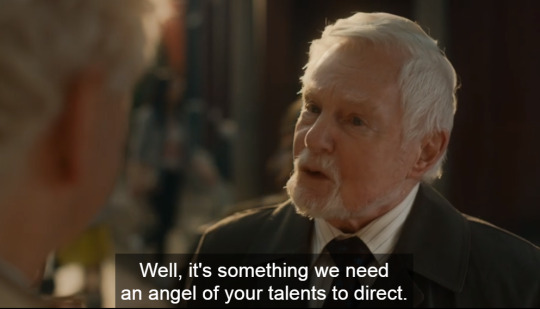
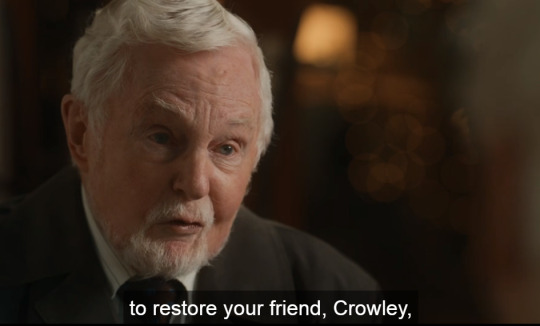

They both show up suddenly with grand promises, telling Aziraphale and Zuko exactly what they want to hear. You can come Home. You can come back to Heaven, and so can Crowley. We need you. We want you.
They both emphasize that they are delivering good news, really hyping it up. They are so kind and understanding. Take all the time you need.
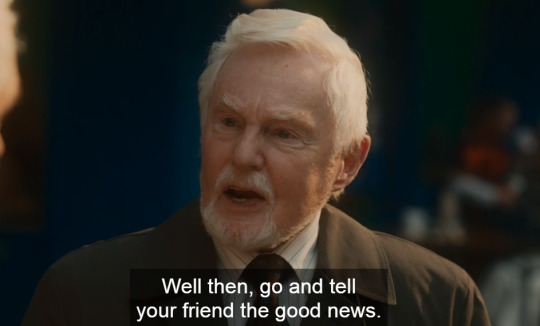
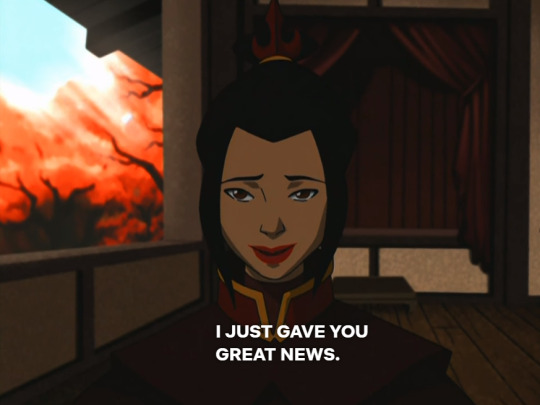

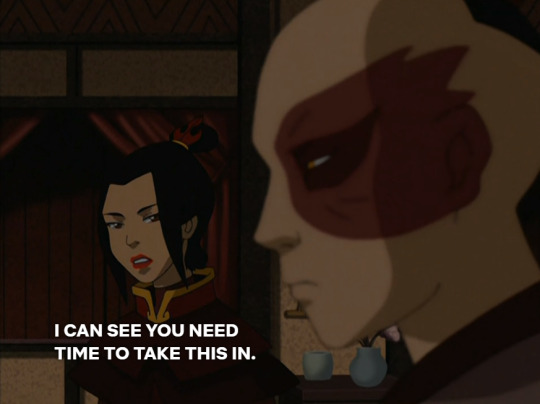
But at the same time that they are warm to their target, they show open disdain to their closest ally when their backs are turned.
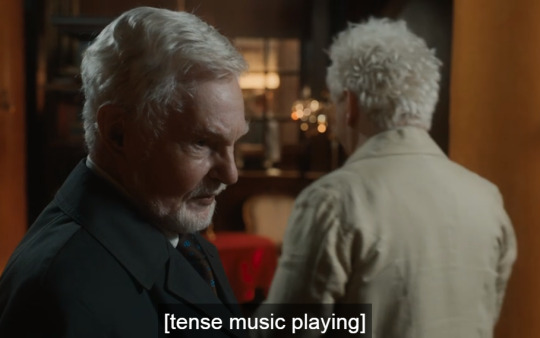

Next, we have Aziraphale and Zuko:
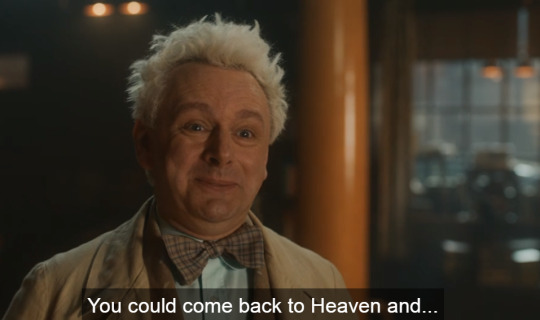

At this point, Zuko still believes in the vision of the Fire Nation, he believes that they are honorable and right in what they do, and Aziraphale believes that Heaven is the epitome of goodness, truth, and light. The word "indoctrination" comes to mind. They've both been burned by the people they look up to, but are blinded by their ideals.
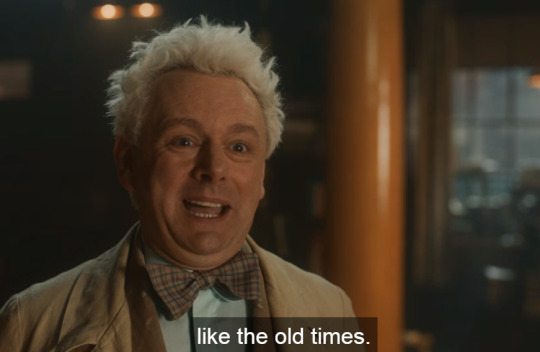

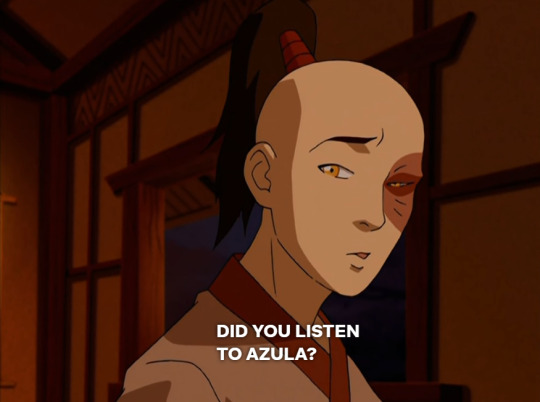
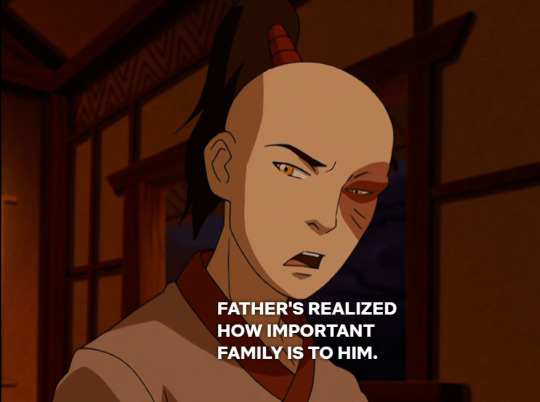
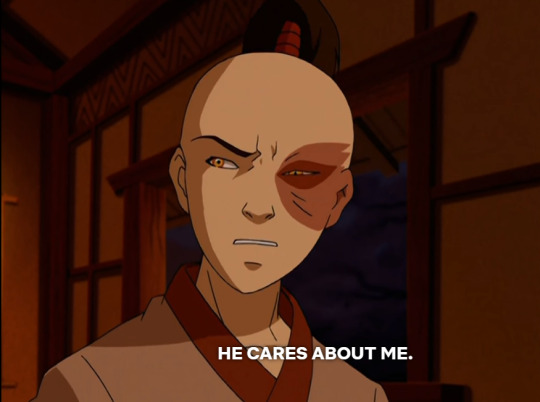
They're extremely loyal to their side, and there's more than a little denial at play. When Crowley and Iroh express distrust and a desire not to go, they get defensive, they lash out. You don't know, you don't understand.
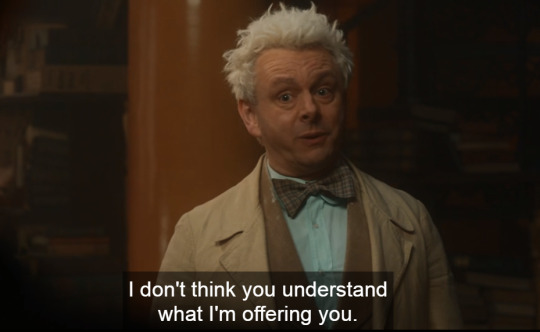
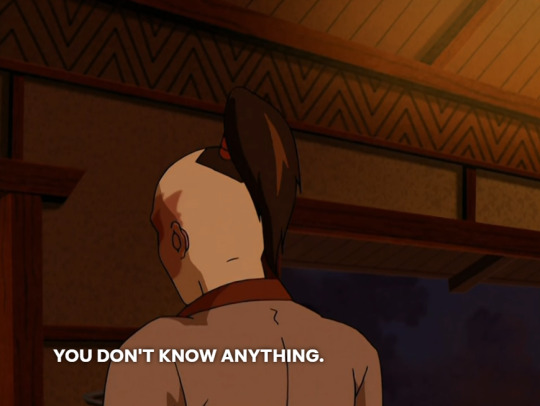
Finally, we have Crowley and Iroh:
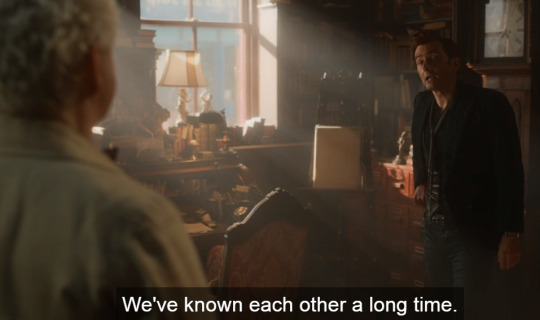
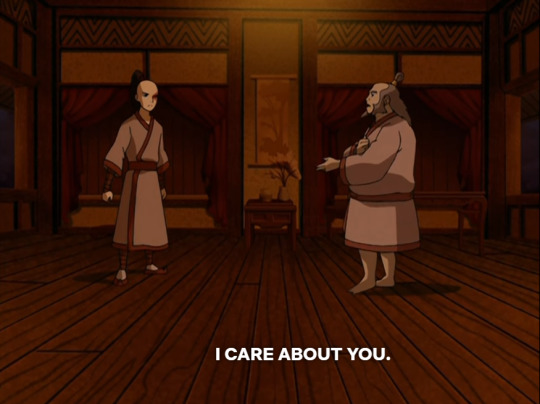
They truly care for Aziraphale and Zuko. They're always there for them and would do just about anything to protect them.
They are a bit more worldly than their companions and are suspicious of the Metatron and Azula's intentions. In our family, things aren't always what they seem. Heaven and Hell are both toxic.
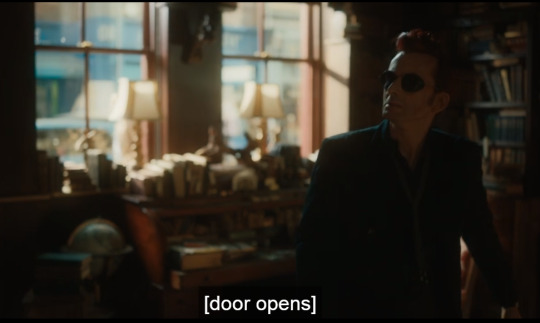
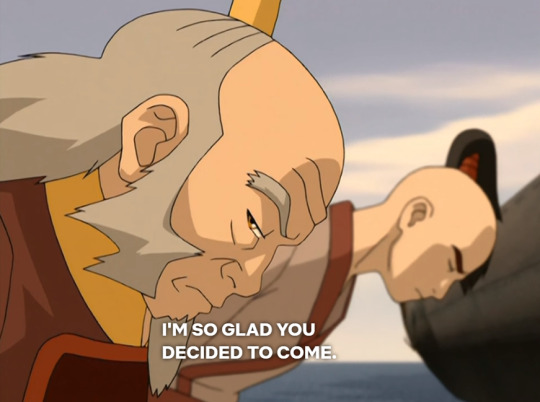
They both receive the same invitation to join the others, to go Home, to go to Heaven, even though the main focus is on Aziraphale and Zuko. The parallels diverge with these two, however: while Azula doesn't really care whether or not her uncle joins them, as long as she gets Zuko, Crowley was never meant to accept the offer. The Metatron draws Aziraphale away from Crowley to talk, they are separated as soon as possible, and a wedge driven between them.
At first, Iroh wasn't going to go, but changed his mind at the last minute. Crowley does not change his mind.
With how similar these two scenes are, I can't help but speculate on what this means for Good Omens. Is this just an elaborate way of kidnapping Aziraphale? Are the angels taking pointers from their last attempt and taking a more subtle, calculated approach this time?
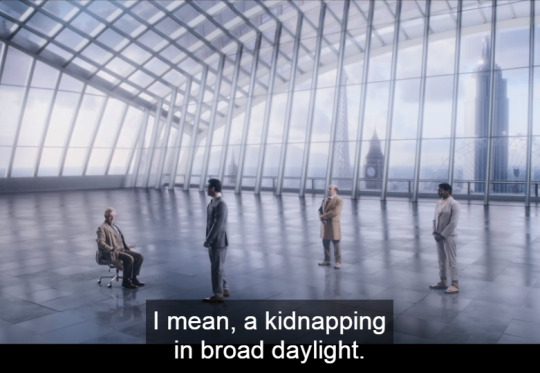
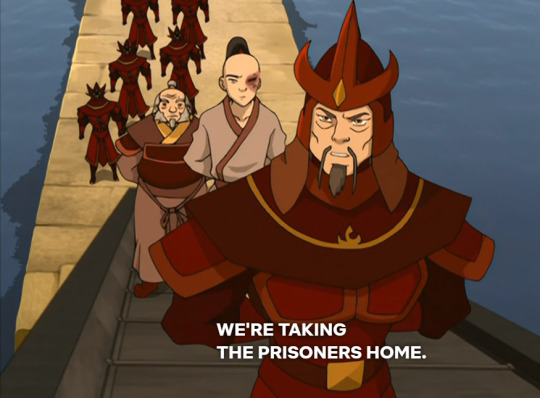
Do they actually want Aziraphale on their side or are they just trying to get him out of the way?
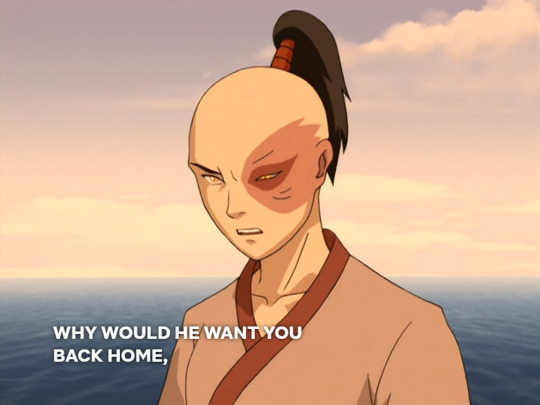
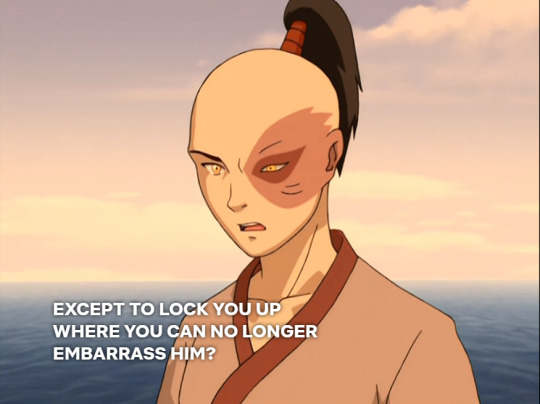
#good omens#good omens season two#good omens s2#avatar the last airbender#analysis#long post#yes hi#i'm coming in with the spicy hot take that heaven is the fire nation#i will not be taking any criticism at this time#they way some of the screenshots have the same framing between the two shows makes me really happy for some reason#it's late and i need to go to bed but i hope this makes sense#holds up the two scenes#they're the same picture#go2#good omens season 2#good omens spoilers
225 notes
·
View notes
Note
Do you have any SDV hot takes?
Boy do I ever Anon! Thank you for giving me the chance to get on my soapbox about this.
Shane doesn't relapse when he is happily married to the Farmer. The popular "relapse" interpretation is based on faulty assumptions about what substance abuse recovery is supposed to look like and flat-out misreadings of the text of the game.
Shane doesn't "start" drinking again: he never stops, just reduces the amount he drinks. (Unless we are supposed to interpret the phrase "cut back" in the 7 Heart Event as meaning "quit” or "gave up” for some reason. Or if we ignore the new 1.6 dialogue about him drinking less after his 6 Heart event.)
Shane's mess is not a consequence of uncontrolled drinking, but a consequence of his depression and possible under-managed ADHD. His room at Marnie's remains exactly as messy when he's in recovery as it is when he's spiraling, so the drinking has no effect on his cleanliness.
”Okay,” you might say, “but he still shouldn’t drink, and he should pick up his room.” And sure, yeah. Ideally we should all do the same. But that’s not always a fair or realistic expectation for everyone. Not everyone can quit their addictions or bad habits cold turkey. Not everyone is going to be the model citizen. That doesn’t mean they can’t live happy lives. That doesn’t mean they don’t have value. That doesn’t mean Shane doesn’t have value.
So instead of complaining about the ways that Shane fails to measure up to typical adult standards, it may be more productive to ask: is he happy? Is he doing okay? By any reasonable measure, a married Shane is living his best possible life. He‘s surprised and delighted to be your trophy husband. He doesn’t have to worry about taking a soul-sucking job or struggling with unemployment. His drinking isn’t causing him any problems, and if he can’t keep his personal space clean, at least he doesn’t let his mess spread to the rest of the house. He has his own little coop for Charlie and it’s just adorable to watch him bounce her up and down. He actually makes time for Jas.
I am not requiring everyone to love Shane the way he is written, or to make space in their farmhouse for him. But please, have realistic expectations for the character that exists. And do make friends with him. He gives you an OP recipe and access to blue chickens!
#My other hot take is that people shouldn’t install mods that “fix” NPC character flaws#Yeah it bothers me too when Penny pushes George’s wheelchair without consent or when Clint gets on his “Nice Guy” hobbyhorse#But CA gave these characters flaws for a reason#Flaws add interest and depth to characters#Instead of knee jerk rejecting my discomfort with the character’s bad behavior#I can sit with it and reflect on my own behavior and values#And I can recognize the worth even in characters who don’t share my values#Or who don’t change and grow in the “right” way#After all I’m not gonna share all your values#Or always change and grow the way I ought to#But we all gotta live together and give each other a little grace#Anywho those are my hot takes#Thank you for your time#shane stardew valley#stardew valley#media analysis#media criticism#media literacy
83 notes
·
View notes
Text
I think the biggest difference for me between projects (like to be clear I think NATLA is not good as an adaptation or a show, and I think the PJO tv show works as an adaptation and a show) is something that feels so basic, but shocked me when it clicked, which is that
NATLA has no actual visual storytelling going on
Which sounds ridiculous, but let me explain what I mean. "Visual storytelling" is how you communicate aspects of character or relationship through visual framing, parallels, that kind of thing, usually to indicate progression or a character's viewpoint. Many people have noticed that NATLA's cinematography leaves much to be desired, there are some shots that are good particularly in episode 6 (the Zuko transition shots between past and present, and one of the ending shots between him and Aang) but that's by and large the exception.
What I mean when I say "visual storytelling" is that NATLA doesn't have visual motifs. It doesn't really have parallels happening that much in the text or in the visuals. And this is something that ATLA did really, really well, all the time, particularly with Zuko's scar. Just take this framing of Zuko and Aang, in particular, from The Storm and The Blue Spirit.

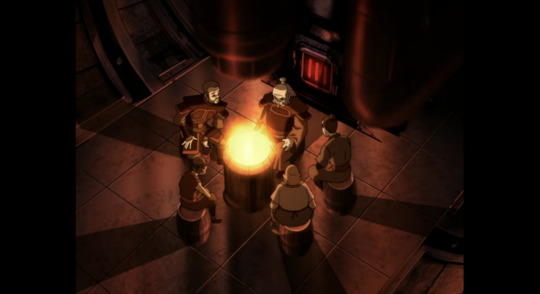
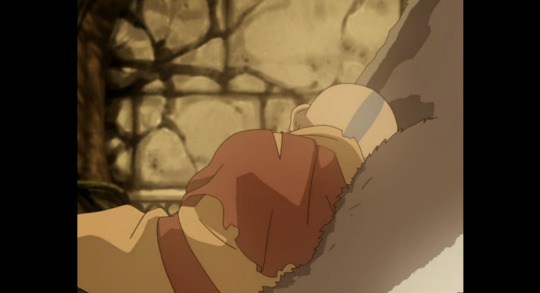

They even have consistent colour tones of Aang having a warmer, lighter yellow (Air Nomad) and Zuko having a darker, deeper red (Fire Nation).
And this is something I think Percy Jackson does pretty well. They have consistent motifs / descriptions if it were, particularly when it comes to Percy and Annabeth's relationship and her character.
Percy: [Choosing Annabeth] And if the mission required someone to push me down a flight of stairs for it to succeed, you want someone who won't hesitate when they do it.
Percy: [literally pushes her down the stairs but to save her life]
Ares: You're new to the family, young one, so let me fill you in on how we work. [...] Olympians fight. We betray. We backstab. We will push anyone down a flight of stairs to get ahead.
Annabeth: This isn't the Arch, Seaweed Brain. You're not pushing me into the stairwell aagain.
Percy: Yes I am! [...] It's why you're here. When I was choosing my team, I told Chiron I needed someone who wouldn't hesitate to sacrifice me if the quest required it. He agreed. That was you. [...] You're better at this than me. You just are.
Annabeth: [Refusing to get back in Athena's good graces] It isn't how it should be! It isn't. Eat or be eaten [referencing the Kronos story Ares said earlier]. Power and glory and nothing else matters. Ares is that way. Zeus is that way. My mother is that way. He isn't that way. He's better than that. Maybe I was that way once. But I don't wanna be that way anymore. I won't be like all of you. I just won't.
But we also see this visually.
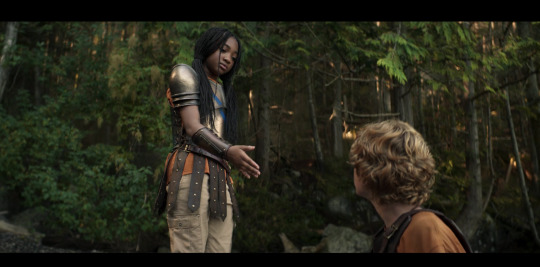


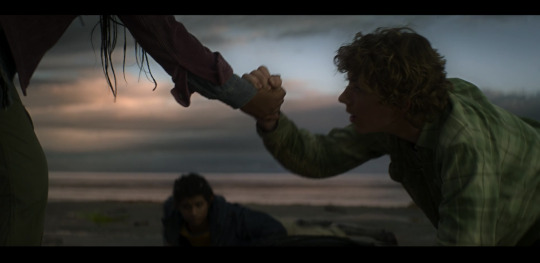
And to be clear I think it's well done, I'm not saying this kind of thing is a Masterpiece™ but what I am saying is that if you do these things, it's a great way to convey information to your audience visually and a sense of progress both in individual characterization and relationship development. And it just makes sense to lean on things visually if you're a visual medium, because prose can't do framing like this to the same degree.
And NATLA just... never does it. There's almost no real parallels, there's very little framing happening, and the even more intense overload of exposition does not help matters in this way either. The original series had a lot of parallels steadily built up (i.e. Aang's presence in the SWT and Sokka's plotline in Jet -- hell, even some of the lines he gets at Roku's Fire Sage temple -- were to show how Sokka was moving away from a more xenophobic worldview even if it was still a work in progress). There were also more overt ones, such as Sokka dressing himself for battle versus Zuko having guards/servants do it for him, but both ultimately tether the two together into having to put on a performance of confidence, manhood, and war more so than being the children they actually are.
And NATLA just has... no real visual parallels. The closest we get is the parallels between Sokka-Yue, Tui and La, and Kataang in the finale, but that's about it.
There's not a lot of scenes where a character is presented the chance to make a similar choice only to then make a different one. Even Aang wanting to go to the NWT to make a difference is muted because he never actually ran away in the first place; when you rip away character flaws or mistakes, you also gut their room for growth. When you strip away visual storytelling, it means that what you see on screen is a 1:1 of exactly what you're getting, and that is just a lot more Boring to watch as well as gutting your chances to show more character exposition. And it's just - it's just not good
#natla critical#natla#pjo tv show#the one that kills me the most is when hahn is like 'you have something the rest of us don't [in fighting the FN]: experience'#and it's like. sokka has not fought zuko or barely any firebenders since the pilot#the only other time his fighting skills got developed was with suki. also at the beginning#he has not done basically anything since then warrior wise. nvm with the fire nation directly#analysis series#analysis#sincerely a very tired nb english major#pjo
71 notes
·
View notes
Note
Hey! So I've been following you since you posted a lot about good omens in 2019ish? I remember you talking about wing fics vividly, but I just want to ask:
How are you doing after season 2?
Good! I enjoyed season 2, and I look forward to seeing how things resolve in season 3.
I think there are a lot of folks upset about various things, for various reasons, a lot of which boil down to "the season didn't go how I wanted it to/thought it should go" or "the season didn't end wrapped up neatly like S1 did." Neither of which, imo, are fair judgments of a season that a) isn't that person's story and b) was meant to be a bridge not an ending. Everyone is entitled to their opinions, of course, and to their feelings, but I do wonder how many have taken honest assessment of those feelings and opinions.
In my opinion, it's unfair to claim a story is bad JUST because it didn't do what you wanted it to do. It's not a bad story just because characters didn't act how you predicted or wanted, either. Some of the responses I've seen hinge almost entirely on "but canon didn't do what fanon/I decided is best" usually with the caveat of "before I even saw the season" and that's... ignoble at best. It's fair to criticize poor storytelling, but I feel like you have to have the whole story, or most of it, to do that, and we don't have that. We're actually smack in the middle of the story, by my judgment.
This season was never meant to be The Whole Story, we have known for a long time that there is a season 3 planned (whether or not it's ever able to come to fruition is a separate issue, it has been planned since a long time ago). As such, I don't think it's fair at all to the story to be angry that the season didn't stop at a nice, neat, happily-ever-after, because this isn't the end of the story.
To quote one of my favorite authors, Peter S. Beagle: "Things must happen when it is time for them to happen. Quests may not simply be abandoned; prophecies may not be left to rot like unpicked fruit; unicorns may go unrescued for a very long time, but not forever. The happy ending cannot come in the middle of the story."
They cannot have a happy ending until they've fixed the problems, and even before the end scene there, problems abounded. The unicorns are still unrescued. It's still the middle of the story.
#good omens#go2#asks#listen I'm first in line to criticize bad storytelling#but I have to let someone tell the story first lol#y'all saw me bitch over Eddie's story in stranger things#you KNOW I'm good at story analysis and meta#I'm not particularly concerned by anything that's happened!#because it's not the end#of COURSE there are going to be problems#you can't solve the problems without first having them#I know none of you are THAT unstuck in time#also like geezus at least your entire ship is still alive#it could be worse folks#also not for nothing but like there WAS a season outside of crowley and aziraphale#and it was pretty cool actually!!#Gabe and Beez???#Nina and Maggie???#parallels galore???#once everyone calms the fuck down this is gonna be a treasure trove#esp once we have season 3 in our hot little hands and can look backward#that's gonna be so fun
203 notes
·
View notes
Text
Toothless (and generally most dragons) lost all his personality in thw.
Gone was the loyal, protective, intelligent, curious, silly, expressive, understanding, and sassy/snarky dragon we adored more and more through each new installment in the franchise.
Who is this puppy in thw and what did he do to Toothless?
Look me in the eye and tell me that if anyone, dragon or not, was to pluck Hiccup off his back and send him into the ocean to die, they wouldn't get a minimum of two blasts in the face.
Yes, Toothless is playful and silly and adorable, but only around the people/dragons he trusts, and especially around Hiccup specifically.
Otherwise, his guard is up, he is wary, and he himself has to evaluate whether or not someone is safe to be around.
"Hey, I guess Dean dumbed him down because he wanted to show the effects of domestication—"
Woah there, big words.
Domestication? The definition of domestication is "the process of taming an animal and keeping it as a pet or on a farm".
That is not what's happening on Berk.
Dragons were never pets to humans. (If anything, humans were their pets.)
They stood by the Vikings' sides out of their own volition, and were free to come and go as they pleased.
We see this clearly in GoTNF.
They wouldn't let a human they didn't trust so much as touch them, let alone allow them anywhere near their backs.
They are the ones that choose their riders, or if they even want one, not the other way around.
And they weren't exactly "tamed" either. Or rather, nobody tried to alter their nature and innate instincts.
In RoB, we clearly see that Vikings are the ones who adjust, who adapt accordingly, because dragons are gonna do what dragons do.
And those instincts of theirs were honed. They weren't tamed, they were trained.
The notion that wild dragons are more powerful because they're wild makes no sense to me, because while wild dragons have raw power and raw instinct, trained dragons arguably have more than that.
They learn to work with other dragons, and they're able to pull off some incredible moves, because their bodies are, well, consistently trained.
They go on dangerous missions on the regular, for fuck's sake. During which, they also have to think. The dragons aren't told what to do, nor are they steered by their riders constantly (and when they are, the dragons trust them to do so)
They can take the reins as well (and when they do, the riders trust them to do so), but most of the time, they both move together in sync, understanding what, and how it, needs to be done.
In what world would such a lifestyle weaken them, or threaten to erase their aforementioned instincts?
I don't get Dean's point.
And Hiccup? What's up with the poor decision making?
Because I know damn well Hiccup wouldn't let dragons take over Berk to the point where, within the first ten minutes of the movie , half of it collapses. An event which apparently everyone is used to, because nobody worries about it.
He put an ocean between Garff and a couple of dragons because of how incompatible they were, in terms of needs and way of life.
He relocated dragons constantly, so as not to overcrowd and/or to protect the Edge.
Even when he was, what, 15 in RoB/DoB, he was mindful of the way he handled situations, to ensure Berk and the Vikings wouldn't be overwhelmed with dragons.
He understood that it's impossible for thousands of dragons to cohabitate with humans, and with each other, peacefully and without chaos.
Not to mention, he respected dragon culture and understood that some spaces were not made for the human eye. He made such a big deal about revering Vanaheim, and you expect me to believe he'd be okay with just exposing a place called The Hidden World, a delicate draconic paradise?
And wow, way to go, let's uproot the ENTIRE village, and go searching for this place that we don't even know for sure exists? Yes, very responsible.
And why not just make a life-changing call without consulting anyone, or thinking it through, based on what you alone think is best, while you're at it? Sounds like a great idea.
It's not like in previous installments he always made sure to have a team huddle to discuss (or at least inform the group of) their next move, even in the tightest of spots and with the littlest time; no, of course not.
His leadership abilities, his tactical and strategic thinking, his caution, his conviction and determination? Gone. Erased.
Who is this guy in thw and what did he do to Hiccup?
And as for Toothless and Hiccup's dynamic in this movie, something that Astrid said bugs me to an unfathomable degree.
"You gave him his freedom back, what did you expect?"
Woah there, big talk.
This paints a horribly ugly picture. It makes Toothless seem like he'd been held captive by Hiccup, that if he could've flown on his own, he would never have stuck around this long.
Which, much like the rest of this movie, is a load of horseshit.
Toothless is just as free, if not free-er than, as the rest of the dragons. Because while all dragons love and trust their riders, and vice versa, nobody has a connection quite like Toothless and Hiccup (save for perhaps Valka and Cloudjumper).
Toothless could've been flying on his own for a long, long time now. But he didn't want it. He was vehemently opposed to the idea.
Why? Because to him, flying was no longer worth it if Hiccup wasn't right there with him. Because Hiccup took the loneliness out of flying. Because Toothless wanted nothing more than to be by Hiccup's side. Hiccup was the one that made flying worth it.
A major theme of this movie is learning to fly on your own. Toothless had to learn how to fly without Hiccup, and Hiccup had to learn how to fly without Toothless (I mean, personally I'd rather them remaining inseparable soulmates that are mildly codependent. I recognize it's not necessarily the healthiest dynamic, but fuck if I care)
Toothless did this through meeting his mate, and falling in love (no matter how horribly written and designed she is, and no matter how I personally would've preferred for the Hicctooth bromance to remain undisturbed).
He met a creature that he wanted to follow and be alone with, a creature that made flying alone, with nobody on his back, worth it.
And more importantly, Hiccup had to realize that he's not who he is because he has Toothless, and subsequently the dragons. It's the opposite.
This is growth, and the realization that they don't need each other is important.
But why the fuck does that mean they have to say goodbye?
I don't need most of the people in my life. That doesn't mean I don't want them here.
The point was that Hiccup doesn't need Toothless in order to be someone.
Not that he didn't need Toothless, period.
(Even if the point was simply that he didn't need Toothless, which I could concede to, that again doesn't mean that Toothless had to leave, and take the entire dragon population with him.
To me, that sends a message of "if you don't need them, then they gotta go".
It's not what outgrowing a friendship looks like, despite the fact that many people choose to interpret it as such.
Sure, this movie shows what outgrowing a friendship is; if outgrowing a friendship means making room in your life for other people. If outgrowing a friendship means you found romance. Which is ridiculous.)
___________________
To further clarify:
I am well aware the shows aren't canon.
This, however, doesn't change the fact that all these series tie in with HTTYD 2 really well, and that they make sense.
They expand on the characters and give us a better grasp of the world in httyd. They allow us to understand everything better.
When you only have, at most, 150 minutes to tell a story, every minute of it needs to somehow add to the plot. To further the narrative. There is very little time for fluff.
In a movie, it's practically impossible to properly explore the characters' different dynamics, to give everyone their own arc, to let the audience bask in the slow moments and to let the characters just be.
In a series, however? Well. You've definitely got time.
For someone who only watched the movies, it would be pretty damn difficult to understand the mis-characterization in say, Snotlout, Fishlegs and the twins.
You don't know these characters that well. You don't know the well-established dynamics between the gang in the same way that someone who's watched the series does.
Which is exactly why I think that people who've watched them are the ones that dislike the hidden world the most.
I, too, am usually opposed to using non-canon material to make a point, but RoB, DoB and RTTE are the only spin-off series from a successful movie franchise I can name that make perfect sense. That succeed in accurately portraying the main cast, in realistically expanding on the secondary characters (like Fishlegs, Snotlout, and the twins, who now have the space to become part of the main cast), and in smoothly integrating new characters.
They also manage to beautifully explore this magical universe full of dragons, adventure, and mystery, while firmly establishing the dragons as an important part of ecosystems all around.
Whether it's subconscious or not, they create an unshakable image of how all the characters think, act, and interact. You spend a hell of a lot longer with the characters in a lengthy eight season series than in two movies.
But it's not a bad thing, because this image carved by the series fits in nicely with the image carved in all the canon installments of the franchise.
Well. Except for one, cough cough.
#and don't get me started on the rest of the cast's characterization#along with their dynamics and interaction with each other#my anti thw agenda#thw criticism#thw slander#thw salt#this rant is a mess#and possibly nonsensical#and i possibly veer off topic a million times#not sure#hiccup haddock#toothless#exactly because i love them so much do i hate this movie with such vitriol#analysis#long post#gratuitous use of the words “dragons” and “humans”#the hidden world#rtte#httyd rob#httyd dob#besides#if the series were canon then thw would make significantly and i mean SIGNIFICANTLY less sense#still the fact that you don't even NEED to bring them up to explain why the movie sucks is a pretty good indication#that even without their existence thw would still suck#though it would be less obvious#hictooth
126 notes
·
View notes
Text
"Minkowski's been talking about Sondheim again…": Minkowski's love of musical theatre and what it reveals about her characterisation and her relationships
TL;DR: Renée Minkowski's love of musicals, while it might seem just like a mundane character detail, is used to give depth to her character because it contrasts with expectations of her from both the listening audience and the other characters. Her willingness or unwillingness to share this interest in different circumstances reveals her relationships with other characters at various points.
Since this is a long one, if you'd rather read it as a document, you can view it here: Google Doc version.
"She actually really cares about these talent shows": Episode 8 (Box 953)
In the early episodes of Season 1, Minkowski is presented (largely through Eiffel's unreliable perspective) purely as a strict no-nonsense authority figure without much emotional depth, the kind of person who only likes things that are useful, purposeful, or mandated by Command. In contrast, musical theatre is a creative pursuit that has nothing to do with the mission of the Hephaestus and is viewed by many people as fairly frivolous or silly. The gradual exploration of Minkowski's passion for musicals is one of the many ways that the show expands and challenges our understanding of her as a character.
The first indication that we get of her interest in musicals is through her entry into the infamous talent show, something that is required as part of the mission. Minkowski really cares about 'crew morale' activities in general, even when they actually have a negative effect on morale and even before she's friends with any of her crew (for example, the Christmas and Thanksgiving dinners in the earlier stage of the mission), perhaps partly because doing things in the "right way" is important to her.
But Eiffel senses that the talent shows aren't just about rules for her: "it’s bad enough when she makes us do something just because it’s military protocol, but I think that she actually really cares about these talent shows". This might be the first indication that we get of Minkowski caring deeply about anything that isn't inherently part of her role as a Commander. Moments like this are part of the gradual process of giving us insight into her character beyond the Commander archetype that she tries to embody. And yet, she only indulges her theatrical passion because something mandatory gives her permission, or an excuse, to let another part of herself out.
Of course, to satisfy the needs of a talent show, she'd only need to provide a performance of a few minutes. But Eiffel mentions "the second act of the play" - which along with Hera's comment that "Isabel isn't the biggest role in the play" - implies that Minkowski was intending to put on the whole of Pirates of Penzance as her talent show act, rather than a few of the songs or some kind of medley. (I suppose that Eiffel could be exaggerating or Minkowski might have been planning to do extracts from different parts of the play, but I prefer the interpretation in which Minkowski gets to be more ridiculous.)
Even though no one else would be willing to be in her production of Pirates of Penzance, Minkowski casts Hera as Isabel, a role with two lines and no solo singing. I found some audition notes for this play which said "The traditional staging gives [Isabel] more prominence than the solo opportunities of the part suggest, so she must be a good actress" which does make me sad in relation to Hera's inability to have a more significant role by being physically present on stage.
It’s sweet that Hera still wants to take part though. She tells Eiffel "Pirates of Penzance is a classic of 19th century comic opera", so either she’s absorbed what Minkowski has told her about the show, or she’s done her own research and formed her own opinions. I enjoy the fact that Hera is the one Hephaestus crew member who shows potential to share Minkowski's musical theatre appreciation; I like to think that this is something they could explore together post-canon.
Anyway, I'm obsessed with the idea that Minkowski was planning to play every character except one in Pirates of Penzance, a show which is designed to have 10 principal characters and a chorus of 14 men. It seems that her contribution to the talent show was supposed to be an entire two-hour two-act musical, with costumes and props, in which she would play almost all of the parts. This is very funny to me as the perhaps predictable consequence of giving an ambitious and frustrated grown-up theatre kid a position of authority and asking them to arrange a talent show. Minkowski knows that the audience will be made up of her subordinates who are theoretically obliged by the chain of command to watch and listen, so she absolutely tries to make the most of that opportunity. There's probably also a degree to which she limits other people's involvement in her musical because - as with her other endeavors - she wants the outcome to be almost entirely within her control (something that is usually pretty much impossible in as collaborative a medium as musical theatre).
Of course, Minkowski's behaviour in most of the talent show episode is affected by her being drugged by Hilbert. This creates an exaggerated situation which is the first real opportunity for Minkowski to be something other than the strict sensible authoritarian Commander and the foil to Eiffel's jokey laid-back attitude. I don't agree with ideas that being intoxicated brings out anyone's true self (especially in the absence of consent for the intoxication), but it seems pretty clear that being under the influence of whatever was in Hilbert's concoction caused Minkowski to fully commit to a level of manic enthusiasm for her musical production that might have otherwise been obscured by her professionalism. It's a particular kind of person who belts showtunes when drunk, and Minkowski is that kind of person, even if that's not how she wants to present herself. (As a sidenote, I seem to remember that they took Emma Sherr-Ziarko's script off her to help her sound more drunk. It's an excellent performance.)
Minkowski wants interval ice cream. She wants "pirate costumes" (and she'll threaten to shoot a man to get them). She wants "swashes and buckles". She wants whatever props she can get her hands on (including a real cannon). This show is important to her, even though only three other people will witness it and two of them actively don't want to be there. It’s important to her for its own sake.
Eiffel says Minkowski wants "a second pair of eyes to tell her if the prop sabre for her Major-General costume was a bit much…" While I certainly wouldn't put it past Goddard Futuristics to have a prop sabre on the station for no apparent reason, it feels more likely that she might have made it or adapted some existing item. Which suggests that maybe she was that passionate about the props even before Hilbert drugged her.
Even so, it does feel significant that Minkowski's love of musicals is only revealed in the episode in which she is drugged, exhibiting lowered inhibitions, exaggerated behaviour, and an "impaired euphoric effect". Her love of musical theatre is initially revealed through a professional structure that provides permission, and then further emphasised by a forced intoxication that exaggerates some impulses that perhaps she already had.
"Some hobbies other than making trains run on time": Episode 17 (Bach to the Future)
After Eiffel tells to find Minkowski to find something else to do while her work duties have quietened down, they have the following exchange:
EIFFEL: You must have some hobbies other than making trains run on time. Something to do with friends? Boyfriends?
MINKOWSKI: Of course I do, but, well, there aren't really a lot of opportunities for rock climbing or trail hiking in the immediate vicinity.
Even though this quote doesn't mention musicals, I've included it here for two reasons. Firstly, it's very funny to me that, even after the talent show debacle, Eiffel acts like he's never had any evidence of Minkowski's hobbies. She tried to perform a whole play almost single-handedly and it didn't occur to him that this might indicate an interest of hers outside of work. I think this reflects the fairly two-dimensional view that Eiffel has previously had of Minkowski, which her interest in musical theatre didn't fit into.
Secondly, it feels notable that Minkowski doesn't mention musical theatre here. She wants to show that she has non-work interests, but without undermining her own authoritative image. Her interest in rock climbing and trail hiking - while it may be genuine - fits with how she wants to be seen as a Commander. These are hobbies which portray her as physically capable, with a high degree of stamina and a willingness to adapt to perhaps less hospitable surroundings. Of course, Minkowski does have these traits and they serve her well on the Hephaestus. But there's not really anything particularly surprising about her expressing these interests. The surprise in this scene comes from the reveal that she has a husband, a character detail which - like her love of musicals - isn't something we'd necessarily expect from the archetype-based view of her we are initially presented with.
Her interest in rock climbing and trail hiking never come up again, because these details don't really deepen her characterisation (or at least, they aren't really used to deepen her characterisation beyond proving that she isn't entirely all-work-and-no-play). In contrast, Minkowski's love of musicals is brought up over and over because it shows another side of her that she struggles to reveal on the Hephaestus, and that allows more interesting things to be done with her characterisation.
"You wanted to write showtunes": Episode 35 (Need to Know)
Alongside the more high stakes discoveries prompted by the leak from Kepler's files, we also learn that Minkowski applied to - and was rejected from - the Tisch Graduate Musical Theater Writing Program.
Up until this point, we've only had evidence that Minkowski enjoys performing in musicals. But here we learn that Minkowski doesn't just love watching or performing in musicals - she wanted to write them too. This suggests a creative side to her that we never see her fully express.
The course
The Tisch Graduate Musical Theatre Writing Program claims to be the only course of its kind in the world and it accepts just 30 students each year. The current application process requires applicants to: upload play scripts or recordings of songs they've written; answer a large number of extended response questions about their creative process and views on musical theatre; write a 'statement of purpose' which has to talk about why they are applying and include 3 original ideas for musicals; provide a professional resume and a digital portfolio; complete an exercise of writing in response to a prompt; and undergo an interview. The process might have changed somewhat since Minkowski would have been applying (which, if it was soon after she finished college, might have been around the early 2000s) or it might be different in Wolf 359's alternate universe, but I think we can safely assume that applying to this course was a serious undertaking that required an intense amount of commitment and work.
Applying to a course like that isn't something you do half-heartedly or on a whim. You couldn't apply to this course if you hadn't done a fair amount of musical theatre writing already. (The course requires applicants to choose to apply as bookwriters, lyricists, or composers, but I'm not going to make a guess here as to which of these Minkowski went for.) The fact that Minkowski wanted to study this course suggests that she was seriously considering trying to make a career out of musical theatre writing. In Once In A Lifetime, she tells Cutter that commanding a space station has always been her dream job, but we've got evidence here that it wasn't her only dream job. There's something kind of funny and kind of sad about the idea that writing musicals was her back-up / fall-back career path. She does not like to make life easy for herself.
The revelation
This information is revealed against Minkowski's will. It's not something she wanted people to find out, and she isn't happy about them knowing:
JACOBI: "Dear Renée, thank you for your interest in the Tisch Graduate Musical Theater Writing Program..."
MINKOWSKI: Oh, come on!
JACOBI: (pressing on) "We are sorry to say, we will not be able to offer you a spot in this year's blah blah blah." Oh this is too good. You wanted to write showtunes?
MINKOWSKI: Number one? Shut up. Number two, why are my personal records on there?! [...] How is it in any way relevant?!
JACOBI: Oh, I think it's very relevant. I mean, if you're sending someone to pilot ships in deep space, you want to make sure that they can, you know... paint with all the colors of the wind.
Jacobi CRACKS UP - and, although to a lesser degree, so does Lovelace. Minkowski looks at her: really?
LOVELACE: Sorry, Minkowski. It's... it's a little funny.
MINKOWKSI: No, it isn't!
Minkowski seems defensive and embarrassed here. She obviously doesn't trust everyone there with this revelation (Jacobi, Maxwell, Lovelace, and Hera are all present). She considers this information to be "personal" and irrelevant and not even "a little funny". She's used to reactions like Jacobi's (and to a lesser extent Lovelace's); in Ep41 Memoria, she says "most people think it's hilarious that I like musicals" (see below for more thoughts about this quote). But the fact that these mocking reactions are expected doesn't mean that they don't bother her. She wants so badly to be taken seriously and, in this scene, her interest in musical theatre seems to be incompatible with that. Jacobi reacts the way that he does because of the idea that I've already expressed, that a passion for musical theatre does not fit with the serious authoritative image that Minkowski has often presented. It's not the typical hobby of a soldier, especially not a Commander.
To me, the way Lovelace laughs suggests that she might not have previously known about Minkowski's love of musicals, or at least perhaps not the full extent of it. At any rate, it's definitely news to Jacobi. And Minkowski clearly hasn't talked about it enough for it not to feel like a big reveal for her.
The rejection
It's notable that this reveal is not just that she wanted to write for the stage, but also that she failed to get into a course that might have helped her work towards that goal. This of course compounds Minkowski's discomfort at having this information revealed. Not only did she want to write showtunes, but she encountered rejection in her attempts to do so. This detail implies that perhaps it wasn't just the appeal of her spacefaring dream that stopped her going down a theatrical career path.
I'm about to move more into headcanon territory rather than just straightforward analysis, but I personally believe that, while Minkowski auditioned for a lot of musicals (particularly as a child / young person), she was never cast as the main role. She seems embarrassed about her interest in musical theatre in a way that (at least judging by people I've encountered) people who were always the lead in their school / college productions don't tend to be.
We don't have much evidence about her actual level of singing/acting ability, given that she is inebriated during the only time we hear her sing in the podcast. However, it resonates with other aspects of her characterisation to imagine that Minkowski was generally good enough to get an ensemble part but never quite good enough to be cast as a main part. I think she might see only ever being cast as part of the ensemble, and failing to get into the Tisch Musical Theatre Writing programme, as slightly more down-to-earth examples of the same pattern as her repeated rejections from NASA. She is desperate to prove herself. She is "someone who very much wants to matter. To do something important." When she casts herself as almost every part in Pirates of Penzance, she is finally taking the opportunity to be a main character, an opportunity which I imagine had been denied to her over and over in both a literal and metaphorical sense.
"It's just from a play I saw once": Episode 41 (Memoria)
The next scene I want to talk about is from a memory of Hera's, which took place on Day 57 of the Hephaestus mission and in which Minkowski appears to be talking about the Stephen Sondheim musical Sunday in the Park with George:
MINKOWSKI: Oh, it's just from a play I saw once. It doesn't matter. (BEAT) The guy who sings it is this famous French painter. And his entire life is kinda falling apart. But he can always turn what's happening around him into these beautiful paintings.
HERA: And?
MINKOWSKI: And... That's, I don't know. Reassuring, maybe? (BEAT) I don't know why I'm going on about this. You don't care.
HERA: I think it's interesting.
MINKOWSKI: Yeah? Most people think it's hilarious that I like musicals.
HERA: I don't see what's funny about it.
MINKOWSKI: Well, thank you Hera, but you're not exactly... you know.
HERA: I'm not... what?
There's a couple of different things I want to pick out from this exchange. Firstly, the line "Most people think it's hilarious that I like musicals" makes me sad. I don't think she's talking about people on the Hephaestus there. Judging by the quote I talked about from Bach to the Future, Eiffel definitely wouldn't have registered Minkowski's love of musicals at this stage, and I doubt Hilbert cares at all about the hobbies of his fellow crew members. So Minkowski is talking about experiences that she's had on Earth, of people mocking her interest in musicals and thinking it doesn't fit with who she is. You can hear the impact of those experiences in Minkowski's reluctance to elaborate, in the way she says that something she obviously cares about doesn't matter, in her assumption that Hera doesn't care.
Secondly, this scene is a complicated one for Minkowski and Hera's relationship. On the one hand, Minkowski freely talks to Hera about something she's passionate about, and Hera listens and expresses interest. Hera validates Minkowski's interest in musical theatre without making a thing of it being weird and Minkowski thanks her. Again, it’s shown as an interest they could could potentially share.
But on the other hand, it seems like part of the reason Minkowski feels able to open up to Hera is because at this point Minkowski doesn't see opening up to Hera as fully equivalent to opening up to a fellow human. She doesn't just accept Hera not making fun of her interest; instead it seems Minkowski is about to imply that this lack of judgment indicates Hera's difference from humans (although she does have the decency not to say it outright). Minkowski's expectation of judgment from others contributes to her saying something very hurtful to Hera here. (This kind of potential consequence of negative self-attitude is explored a lot with Eiffel, so it's interesting that Minkowski can sometimes have a similar issue.)
Minkowski and Hera's conversation is interrupted when:
The DOOR OPENS.
EIFFEL: Hey, Minkowski, we've - What are you guys talking about?
MINKOWSKI: We were just discussing how I'm going to take away your hot water privileges if you don't reset the long-range scan.
Eiffel can obviously tell that he's walked in on a conversation that is about something other than work, or he wouldn't have asked. But Minkowski actively chooses not to tell him that she was talking to Hera about musicals. Perhaps she doesn't know how to open up to a human subordinate about it. Perhaps she doesn't trust him not to make fun of her. Perhaps she just doesn't have any impulse to talk about her interests with him. Either way, if Minkowski's love of musicals is something which reflects a side of her personality outside of her Commander role, this is a moment where she chooses not to take an opportunity to share that side of herself with Eiffel. This reflects the emotional distance between them three months into the mission, which forms a nice contrast with the next couple of quotes I'm going to talk about.
"Composition. Balance. Harmony.": Episode 54 (The Watchtower)
When Eiffel comes directly face to face with alien life, he discovers that music is the human invention that fascinates the Dear Listeners:
EIFFEL: You haven't figured out music?
BOB: ORDER. DESIGN. TENSION. COMPOSITION. BALANCE. HARMONY.
EIFFEL: (low, to himself) Minkowski's been talking about Sondheim again…
I only learned in the course of writing this post that in this moment the Dear Listeners are almost exactly quoting a repeated phrase used throughout Sunday in the Park with George. The titular protagonist lists various combinations of these qualities in multiple songs in reference to his art. In the closing song, the lyrics are "Order. Design. Tension. Composition. Balance. Light. [...] Harmony." It's not only Eiffel's references that the Dear Listeners are incorporating into their speech - they've picked this one up from Minkowski. This also suggests that some element of her appreciation for musicals and the way she talks about them has fed into the Dear Listeners' understanding of the human phenomenon of music. The Dear Listeners aren't just parroting - they understood the quote enough that they left out the word "light", arguably the only quality in that phrase which isn't a big part of music as well as visual art. Eiffel likes music too, but I don't think that this is how he'd talk about his favourite songs.
This is a refrain about finding order and beauty out of the chaos and uncertainty of life, which was also the aspect of Sunday in the Park with George that Minkowski focused on when talking about it in Memoria. It suggests that art/music could be something governed by rules and principles, which is potentially something that appeals both to Minkowski and to the Dear Listeners.
Eiffel's response to this reference is one of those little hints that reminds us that Eiffel and Minkowski have spent a lot of time together and that not all of that time has involved them being at each others' throats or actively in a life-or-death situation. Some of it has just been Minkowski going on about a musical she loves and Eiffel (willingly or not) paying enough attention that he recognises this phrase as a Sondheim quote that Minkowski has talked about. I suppose that this quote might have been in Eiffel's pop-culture-brain anyway, but judging from Eiffel's general tastes and the fact that I don't think Sunday in the Park with George is one of the more commonly known Sondheim musicals among non-musical fans, it seems more likely that this quote is something he only knows because Minkowski has talked about it.
Eiffel sounds exasperated at the mention, like he's heard Minkowski talk about Sondheim far too much. But I'd argue that this still says something positive about their relationship, when we contrast it with a couple of other moments I've already mentioned. Firstly, when her previous musical theatre ambitions are revealed to Jacobi, Maxwell, and Lovelace in Need to Know, Minkowski seems embarrassed and defensive. Secondly, in the memory from Memoria, she avoids telling Eiffel that she was talking about this same musical. Yet, by the time The Watchtower takes place, Eiffel is sick of hearing Minkowski talk about Sondheim. She doesn't have the same barriers up in sharing her interests with him, even though he doesn't have the same interests. I think this is a demonstration of how comfortable she feels with him. It's a hint at the kind of easy downtime that they've sometimes shared.
"One day more": Episode 61 (Brave New World)
Eiffel recognises another musical reference of Minkowski’s in the finale. As the crew are preparing for their final confrontation with Cutter and co., Minkowski quotes Les Misérables, mostly to herself - but Eiffel recognises the lyrics and joins in:
EIFFEL: Hey - chin up, soldier. We're almost through. Just one more day, and then we're done.
MINKOWSKI: Yeah, one more day. (more to herself) The time is now, the place is here - one day more.
EIFFEL: - one day more.
They both stop, dead in their tracks.
MINKOWSKI: Did you just - ?
EIFFEL: Was that what I - ?
They look at each other: No way. And BURST INTO LAUGHTER.
EIFFEL: Man... this is really it, huh? The end of everything.
It feels really important that Minkowski and Eiffel share this moment of togetherness before she tries to send him back to Earth and before the rest of the action goes down. I think there’s some nice symbolism about them finding a way to communicate that they both understand. Making references is Eiffel's thing, and musicals are Minkowski's thing, so this is a synthesis of their two approaches. Again, there's a contrast with Minkowski's previous unwillingness to share her musical theatre passions with Eiffel (at least without the mitigating circumstances of a mandatory talent show and some kind of intoxicating substance).
I talked about the significance of the fact that they reference this particular musical in this post from ages ago. I don't think it's too much of a spoiler for Les Misérables to say that the revolution that the song One Day More is building up to does not end well for the revolutionaries. When Eiffel says "Just one more day, and then we're done", it encompasses both the possibility that the crew will escape to travel back to Earth and the possibility that they will all die. Minkowski's reference to a famously tragic musical suggests that it's the latter possibility that's at the forefront of her mind (right before she tries to send Eiffel away from the danger). But Les Misérables is also a story about people standing together in solidarity against powerful oppressive forces, which gives particular resonance to the way that this reference brings Eiffel and Minkowski together in a moment of being completely on the same wavelength as they prepare to fight Cutter and Pryce's plan.
When they laugh here, it's not about the 'hilariousness' of Minkowski's interest in musicals, it's about their unexpected unison - Eiffel's recognition of Minkowski's reference and Minkowski's surprise at the fact he joined in. It's a laugh of togetherness, of shared understanding, of friendship. It's a moment of lightness in dark times. And that moment is provided by Minkowski's pop culture interests, not Eiffel's. In spite of all they've been through, she's not lost that part of herself, and in fact, she's more open about it, at least to Eiffel.
I'll finish by highlighting what Eiffel says when he's trying to get into character to impersonate Minkowski so he can turn the Sol around:
EIFFEL: Umm... yes, this is Lieutenant Commander Renée Minkowski. I'm... uh... well I sure love schedules, and, uh, musicals. And that man, who I married…
I just think this is a nice example of Eiffel not defining Minkowski solely by her professional Commander role. Sure, she likes schedules (probably in a personal as well a professional capacity to be fair), but she also loves musicals, and her husband. It is a fairly reductive overview of her as a person, but it feels reductive in a fond way, like these things are part of Minkowski's brand to Eiffel in a way that he might affectionately tease her about. (Credit to @commsroom for this thought.) His view of Minkowski has come a long way from "our resident Statsi agent" or even just "you must have some hobbies other than making trains run on time." He doesn't see any contradiction or inherent humour in Lieutenant Commander Renée Minkowski's appreciation of musicals.
Conclusion
Minkowski's love of musical theatre is used to deepen her characterisation and is one of the ways in which we gradually begin to see her complexity beyond the strict Commander archetype. The degree to which she is prepared to share this interest at various points is used to illustrate the nature of her relationships with other characters: a general unwillingness to show a less serious side of herself; a complicated potential shared interest with Hera; and the growing understanding between her and Eiffel.
If you read this whole thing, well done / thank you 😄 It wasn't meant to be this long - it just happened… Feel free to share your thoughts!
#It's Minkowski Essay Time again!#This is over 4700 words and still doesn't cover it all...#I hadn't quite realised there was so much to say!#Wolf 359#w359#If anyone is more familiar with 'Sunday in the Park with George' and has thoughts on why it might particularly appeal to Minkowski#I'd be interested to hear#I listened to the soundtrack and read the Wikipedia plot summary#but I don't think I really got it#My other significant bit of research was that#in order to see what applying to the Tisch Graduate Musical Theatre Writing Program involves#I had to create an account as if I was actually applying#which might be the oddest thing I've done for character analysis#If it interests anyone I could do a post with more detail about that application process#cos it looks insanely intense#Renée Minkowski#Renee Minkowski#the empty man posteth#I hope no one takes things I have said here as critical of musical theatre people btw#I'm just talking about general perceptions#In general I do enjoy musicals myself from an audience perspective
179 notes
·
View notes
Text
"just because what china is doing with BRI is better than colonialism doesn't mean it's not a form of colonialism"
"just because free ice cream and puppy dogs dancing through meadows is better than burning in fire for 513 years doesn't mean free ice cream and puppy dogs dancing through meadows aren't a form of burning in fire for 513 years"
#if you make a claim without bounding the range of the clauses then youre not rly saying much#i see this sorta logic all the time#like. either your metric of 'better' is unbounded & so broad so as to be analytically useless#or theres a qualitative gap youre not accounting for where you do have a bound & something can be of a different 'kind'#but then you have to establish that the object is of that kind in the first place which just gets you back to square 1!#you have to establish that falls in the range of 'better but not qualitatively different'#which assumedly is what the argument is over in the first place right#this is what happens when you extinguish popular analysis of colonialism of any economic analytic & just turn it to 'bad people'#plus what happens when you dont have a concept of superprofits & how to maintain them vs how to maintain profits#or how quantity becomes quality (at critical points of intensity)#but if you just want a thought terminating cliche you can just say#'at a certain point yes it does lol'
135 notes
·
View notes
Text
Not to be a hater BUUUT-
Every time I hear anything abt the Ahsoka series doing ‘well’ I am baffled.
At most it was a little entertaining and some of the designs looked good. The plot and character work and just everything else was abysmal.
Oh yeah and it reminded us that The Clone Wars and Rebels was a show. That was new and really enriched the world of Star Wars.
#Ezra and Thrawn space adventures forever in our hearts#genuinely what tho#like… did the show do well#or is Disney trying to pull the wool over our eyes#like every criticism of this show goes so hard cause it’s genuinely tragic how bad the writing is#I will not be entering any debates at this time I will simply refer u to a YouTube video#never have my feelings on a show been so well described than in critical analysis of this one#will NEVER forgive them for Thrawn’s character#thrawn#bc I feel like ppl who like thrawn will get this#Ahsoka critical#dave filoni critical#star wars critical#ahsoka series
77 notes
·
View notes
Text
I love that, regardless of any other fey nature or trickery, Morri genuinely seems to love Fearne. There's no question in her greeting that she does see her as her own granddaughter, as much as Fearne sees Morri as her grandmother unequivocally.
#critical role#cr spoilers#fearne calloway#like not to say that morri isn't up to MANY shenanigans. she's an archfey.#but she clearly loves and dotes on Fearne without any complicated feelings#and tbh with the time dilation i get the sense that it's not even really malicious or transactional at least not consciously?#like it's just. yeah she's fey. she's up to stuff.#but it does give me the same vibes as frankly both Marion and Artagan with Jester#Jester is so bubbly and a little bit naive in some ways. so everyone just presumes that she must've been taken advantage of.#OR alternatively like if these people loved her then they can't have been wrong about anything else.#but that's more analysis than i prefer to write in full before we properly see Morri next episode#I'll come back to it though lol
384 notes
·
View notes
Text
L’manberg, Nationalism, and c!Dream
Okay, I know it’s been done to death, but I’ve been reading Benedict Anderson’s Imagined Communities for a class which talks about nationalism as an imagined community, so nationalism has been on my mind. And, of course, my mind’s natural progression was to start thinking about L’manberg and nationalism again. So, without further ado, here’s my post on L’manberg, Nationalism, and how that played a role in c!Dream’s story arc.
(Also, I haven’t written an essay in ages, and I haven’t done analysis in ages, so please cut me some slack lol)
It’s under the cut because this is a very, very long post (3.2k words long, in fact). (you can also read it on google docs if you'd prefer).
What is Nationalism?
To start this all, we need to take a moment to step away from Minecraft roleplay to actually talk about nationalism itself. Since I know most of you are here to hear about the Minecraft roleplay aspect, I’ll try to keep it as brief as possible, but it is very important for context. I’ll bold (and color) the main points if you just want to read those before skipping down to the L’manberg section, but you’re more than welcome to read all of this.
To understand nationalism, you need to understand a bit about how it came to be, which requires a bit of knowledge about the transition from pre-modern to modern times. In general, this transition is often thought to have occurred in the mid-18th century during the Age of Enlightenment and during the time when a lot of revolutions were taking place, such as the American Revolution and the French Revolution. But it’s important to note that there isn’t really such a clear cut line of when this transition from pre-modern to modern times happened, and, in many ways, this change is still occurring to this day.
The most important aspect of this change to think about in the context of this post is in terms of religion, though I will also briefly talk about the shift from dynastic rule to democracy. I want to start off by briefly talking about this because, in many ways, nationalism has taken on the role that religion held in pre-modern times. (Side note: this isn’t to say nationalism replaced religion, but the widespread role of religion in people’s lives today is different than it was in, say, the 14th century).
In pre-modern times, religion gave people a sense of belonging, and this idea of belonging is something I’ll come back to, but, for now, you should know that nationalism gives a similar sense of belonging. I won’t get into too much detail about why Anderson specifically says this is a sense of belonging to an imagined community, but it basically comes down to the fact that you’ll never know everyone in your community (whether that be religious or national), but you still feel a sense of belonging to the collective.
“Okay, Stella, very interesting, but you still haven’t defined nationalism.” Alright, alright, I’ll define nationalism, which requires me to define a nation. In Anderson’s words, from page 6 of Imagined Communities, “it is an imagined political community—and imagined as both inherently limited and sovereign.” I want you to take a note specifically of it being inherently limited and file that away for later.
I said I was going to briefly discuss the shift from dynastic rule to democracy, so I’ll do that now. So, a couple things about these dynastic rules with centralized power: firstly, it was believed that the monarchs had some sort of divine right to rule from God (see how this ties into religion?), and, secondly, a lot of borders were less defined the further you got from the centralized powers. Obviously, with the shift from pre-modern to modern times, both of these things changed, bringing the idea of giving power to the people, and also bringing more concrete borders.
Anyway, moving on. Nations are imagined as inherently limited because no one imagines one nation as encompassing all of humanity. Yes, in modern times borders are very concrete and defined, but it goes beyond that—in a person’s mind, nations are limited because there are always people who do not belong to the nation. It’s not often thought about, but with a sense of belonging comes exclusion. The entire concept of belonging comes from the idea of being with people who are similar to you, and this implies the existence of people who are so dissimilar that you don’t belong with them, and, thus, they don’t belong with you. It can easily become a double edged sword, I think; there is comfort in belonging to a collective, but it can be all too easy to fall into an “us vs them” mentality, which is going to be an important point moving forward.
So, how does this all relate to a Minecraft Roleplay?
L’manberg and Nationalism
Onto the fun stuff! Minecraft Roleplay! Obviously, L’manberg is a nation, so I’m sure you can already see how nationalism is going to play a role, but let’s get into it. First, though, I’d like to give a minor disclaimer that not everything is going to fit perfectly simply on account of the fact that the DSMP takes place in a very sparsely inhabited world, and, honestly, that alone makes governmental structures of any kind really interesting to look at, but I digress since it’s not the point of this post. (It also means that nationalism as talked about in this post isn’t really an imagined community like Anderson claims it is. From a meta standpoint, you could say this sense of nationalism actually leaked into the audience itself, but in the story it’s not really an imagined community).
The DSMP starts out as a world with no borders and no governmental structures of any kind—it starts with no nations. Rather, the DSMP in itself is a cohesive community to which everyone belongs. It’s not a community like nationalism, nor is it a community like religion, nor is it an imagined community in any way. As previously stated, the DSMP is a sparsely populated world, and, at least at the start, everyone knows each other or knows of each other as an individual. This sense of belonging is more akin to a group of friends than anything else, which I think makes the introduction of nationalism especially interesting.
c!Wilbur. What a guy, am I right? He shows up to the server, and he brings with him capitalism and the idea of monopolizing resources—there’s an interesting post to be made about that, I’m sure, but not the point of this one—and, most importantly, he brings with him the concept of a nation. He’s putting up borders, putting up walls, and essentially dividing a place that used to be united, citing L’manberg as an independent country, which is does not include everyone in the server (it’s limited), and which is separate from the DSMP and essentially is its “own server” (it’s sovereign). Sound familiar? Yeah, it’s ✨nationalism✨
I’ve seen posts talking about the fact that L’manberg was specifically satirizing nationalism, and though, despite my efforts, I couldn’t find these posts (if anyone has them please send them to me! I’d love to re-read them and link them in this post), I do think it’s true. I think there’s a lot to be said about L’manberg from a narrative and meta standpoint, and I think there’s a lot to be said about the fact that c!Wilbur was always written as a villain in the story (and not just during the Pogtopia arc, despite popular belief), but I can’t get into it all in this post. So, what I do want to do is come back to the concept of belonging and how that always comes with exclusion, and I want to talk about the “us vs them” mentality.
The reason I say L’manberg is satirizing nationalism is because it takes these facets of nationalism to the extreme. It’s not just a place made to give people a sense of belonging which in turn creates exclusion; L’manberg is a xenophobic nation, and I would go as far to say that its founding was based more on exclusion than inclusion. That is to say, the exclusive aspect was not just an unfortunate yet inevitable side effect of creating a nation. From the very start, L’manberg was founded on the exclusion of non-Europeons, and, more specifically, the exclusion of Americans. Sapnap actually originally wanted to join, but he was denied because he’s American. L’manberg wasn’t ever some place accepting of anyone who came to it, and it wasn’t a place to be free from tyranny, but let’s get into the idea of L’manberg going against tyranny.
The “us vs them” mentality is already extremely dangerous and something to be wary of, and it’s something I think we should constantly be checking ourselves on, but L’manberg takes that to a further extreme. I don’t want you to think this point is completely separate from the point I made before, because they do very much connect to each other and are intertwined. Nations are limited. This means there will always be people who don’t belong to any given nation. Obviously, in this case, members of the greater DSMP do not belong to L’manberg. (I think it’s also helpful to remember that c!Wilbur specifically didn’t allow dual-citizenship; c!Tubbo initially wanted to be a citizen of both the greater DSMP and L’manberg, but that wasn’t allowed, so in the end he became a citizen of only L’manberg).
But, this wasn’t just a case of the greater DSMP being separate from L’manberg. No, they were tyrants that L’manberg was escaping from. c!Dream was a tyrant that L’manberg was fighting against. It’s taking the “us vs them” mentality to an extreme of “we are the righteous good guys fighting against oppression and tyranny, and they are the tyrants trying to oppress us.” It sure sounds like a noble cause—and you can always count on c!Wilbur to spout pretty words that convince people to play on his terms—but is that really the case? In a place that previously had no nations and no real defined hierarchy of power, how could tyranny exist? As I said before, the DSMP previously was more like a group of friends living in a commune than anything else, and tyranny doesn’t really seem applicable in that context, does it? This is c!Wilbur spinning a narrative that is going to continue to affect the SMP all the way to the very end, and it’s also what places c!Dream and c!Tommy on opposite sides from the very beginning, by establishing that extreme “us vs them” mentality.
(Oh, it should also be noted that the “us vs them” mentality very often leads to the dehumanization of the other side, so keep that in mind for when we get to c!Dream).
(Also there’s something to be said about the L’manberg revolution being heavily based on Hamilton, which is based on the American Revolution, which was a very key part of the transition from pre-modern to modern times and how that relates to nationalism, but this post is already getting long enough).
So, yeah, L’manberg was satirizing nationalism. And, ultimately, L’manberg was never good for the server as a whole.
c!Dream and Nationalism, even in the wake of L’manberg
Ough. c!Dream… :( oh he really did walk the path laid out for him by c!Wilbur to the very end, didn’t he?
Listen, everything c!Dream does on the server is ultimately tied back to the founding of L’manberg, and, in turn, to the introduction of nationalism to the server. One of c!Dream’s primary goals is unity (or, specifically, the unity and simplicity of the server from pre-L’manberg times), and this is antithetical to nationalism, or, at least, to the extreme form of nationalism that L’manberg brought. Because nationalism brought division, and division brought conflict, and conflict brought death (specifically canon deaths). And, well, we all know how much death is a motivator for c!Dream.
(Also, there is something to be said about the start of nationalism and nations on the server not being framed as a good thing in the narrative, how it was satirizing and criticizing the concept of nationalism, and there’s something to be said about how the narrative agrees with the group of anarchists—the Syndicate—who push against the idea of nations. But, well, that’s also a post for another day).
Now, obviously, unity is not c!Dream’s only motivation—actually, I think we’d all agree that the thing that motivated c!Dream the most was fear. But, a lot of this fear does tie back to L’manberg and the narrative built by c!Wilbur. So, let’s for a moment take a look at how this narrative affected other people’s perceptions of c!Dream.
Remember how I said the “us vs them” mentality often leads to dehumanization? Well, well, well. Listen, this is dreblr. The dehumanization of c!Dream has been talked about to death, but that’s because it’s always relevant to his character!! And I’m here to say that this dehumanization started all the way back during the L’manberg revolution when c!Wilbur labeled c!Dream a tyrant. Obviously the dehumanization of c!Dream is incredibly apparent with the revive book and in Pandora’s Vault, but this is not a post about the box, unfortunately (I’m sorry—I know we all love the box here 💔).
c!Dream’s dehumanization started the moment he was labeled as a tyrant and the moment he was labeled as the “enemy.” He became the “them” in the “us vs them” mentality that was adopted by L’manberg. He’s the oppressor they need to defeat, and he’s the monster that needs to be slain. And this is important because this never went away. Even after L’manberg was gone, the concept of nations and the concept of “us vs them,” never went away! c!Dream was still the enemy that needed to be killed! And, over the course of time when L’manberg was still around, c!Dream lost pretty much everyone. Everyone was turning against him, people were using attachments against him, and people wanted to kill him (New L’manberg was planning to execute him under the false pretense of a peaceful celebration!). And, yes, he did plenty of bad things during this time (namely exile), but I think we should also remember that most people did not know about what happened during exile at this time. They wanted to kill him because he was powerful and dangerous, and he wasn’t with them so he was against them because that’s the narrative L’manberg created—if they’re not with us, they’re against us.
Everyone was against him, and he was spiraling (pushed further by the existence of the revive book) to the point that he commissioned the build of a giant, obsidian, inescapable prison and he locked himself in there with the hope that it would protect him and save his life. (☹️) Obviously that didn’t work like he’d hoped, but… well…
As I said before: none of this stuff went away even after L’manberg was gone. The concept of nationalism didn’t magically disappear from the server just because L’manberg was destroyed. Nations kept popping up. The server kept splitting itself into more pieces and factions, and it all became so convoluted. I think it’s important to remember the population of the SMP—they don’t really have enough people to make functioning governments, yet they keep trying to make nations, anyway. They’re following L’manberg’s footsteps. They’re chasing this concept of nationalism.
Obviously this affected everyone’s lives, but it really did ruin c!Dream’s life. The introduction of nationalism is what causes c!Dream’s life to essentially start falling apart. I don’t want to rehash stuff that’s already been said a lot in dreblr, so there’s a lot about c!Dream’s motivations and story that I’m not including, but I want to bring our attention to a certain line c!Dream said in the finale streams: “Why can’t things be simple again?”
Because things were simple before all this! It was a group of friends making a home!! They built the community center because the server was meant to be a cohesive community of friends. There was never a need for nations or governments! It was just a group of friends making a home together! And then it all became so convoluted, and there were nations when there didn’t need to be any, and people were being divided into sides and being divided into “us” and “them,” and it was so irrevocably different from what the server started as. And I don’t think c!Dream ever really figured out how to accept that it was irrevocable :( and even he himself was blindsided by the story crafted by L’manberg and by c!Wilbur, to the point that he didn’t even fully understand his own goals! Because he (and everyone else) got so used to nationalism on the server and factions and conflicts and “us” vs “them,” that he didn’t even realize he just wanted things to go back to how they were :( oughhhh c!dreamie :((
Sorry to devolve into emotions at the end of this, but it’s not an academic paper, so I think you should cut me some slack. It’s just :( “I don’t ever want to be alone” because with nationalism comes exclusion and it eventually brought c!Dream to a point where he was so, so alone and :( He makes me so sad </3
Anyway, the reason the DSMP didn’t end with c!Dream dead at c!Tommy’s hands is because that was never the point of the story—that was the narrative L’manberg was trying to spin, but that was never what the story was actually about. It took up until the very end for them to break free from the story of L’manberg.
(And, it’s been mentioned many times before, but there’s a reason this was never able to happen until c!Wilbur was removed from the narrative. c!Dream and c!Wilbur and c!Tommy are absolutely crucial in each other’s character arcs, and you can’t really understand any of the duo relationships without considering the third (says the person guilty of writing c!Dreambur fanworks without always thinking about c!Tommy lmao, but hey at least it’s not analysis, right?) but that’s also a post for another day).
I never really know how to conclude things. I’m kind of worried I’m forgetting stuff, and I apologize if I did forget stuff, but I’ve been working on this for, like, 4 and a half hours and am getting tired lmao. But my main points are that L’manberg was satirizing and criticizing nationalism, that the concept of nationalism stuck with the SMP until the very end, and that the concept of nationalism from the beginning set up c!Dream to be the villain (and, really, this is largely in part because L’manberg from the beginning set up c!Dream to be a villain, and I don’t think you can feasibly separate L’manberg from nationalism). Thank you for coming to my TEDTalk! Feel free to ask questions and discuss further, and I will do my best to respond lol.
#dreblr#dsmp analysis#dsmp meta#l'manberg critical#oh I don't know how to tag this 🧍♀️#I think this is probably good but if you have any suggestions for tags to add please lmk o7#anyway spent like 5 hours on this lmao putting my time to good use obviously
52 notes
·
View notes
Text
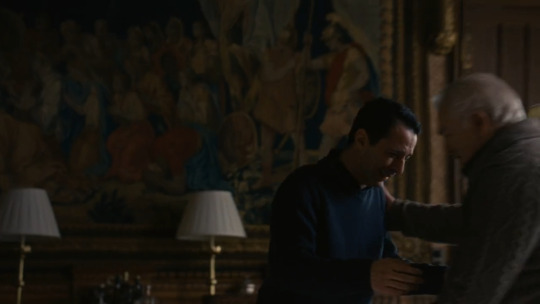
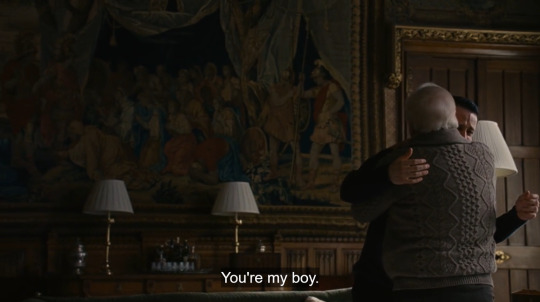

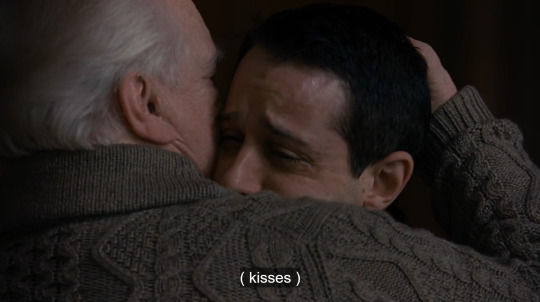


GOD. FUCK. FUCKING FUCK. SHIT. GOD. GOD!!!!!!!!!!!!!!!!!!!! i am seriously never going to be over this scene. the way ken is just completely rendered down into a child again. the weight of the remorse. the burden of guilt and shame. something about the way he stands up arms reaching helplessly toward his father. toward salvation toward absolution toward the sanctuary of childhood. all you want is to be told it's okay, you're just a kid, you're okay. you're still good. You Are Good. and logan knows exactly what to say to wrap him around his finger again. knows EXACTLY which buttons to push. invoking kendall's boyhood. the goodness inherent to children. my BOY. MY number one boy. the kiss. the absolution of his wrongs. forgiveness. the enveloping. kendall was closer than he would ever again be to severing himself from his father. but there logan was again, absorbing his boy back into himself, again. a bearhug for kendall's bear hug. both violent. both brutal. both a kind of swallowing
#. i am still sobbing my eyes out just typing this out#something inside me just crumbles man#every time i hear him say 'i'm sorry' i wilt completely from the inside out#:(#i know there's a much more critical analysis to be made of this scene re: rich people are pieces of shit lol#but purely looking at it through a lens of Shame and Guilt and Boyhood here#kendall roy#logan roy#succession#post#succession s1#and jeremy strong;s fucking ACTING
234 notes
·
View notes